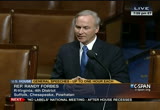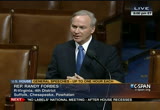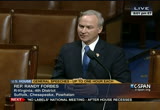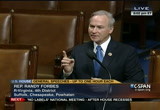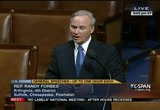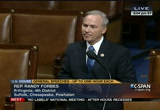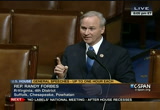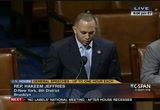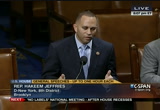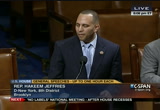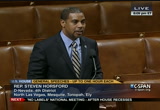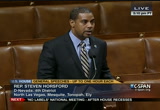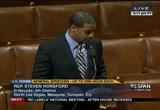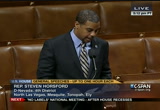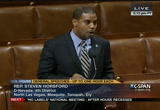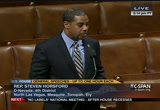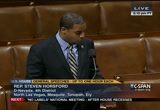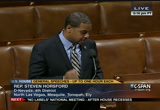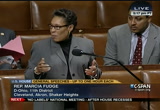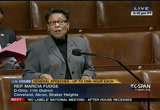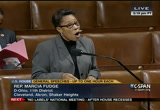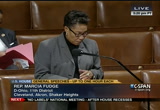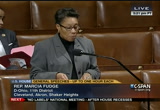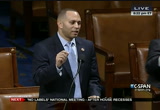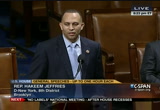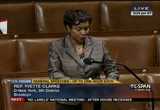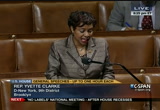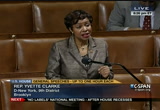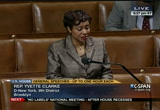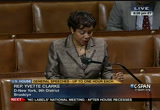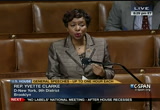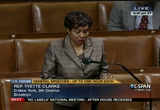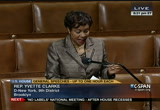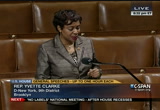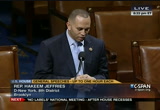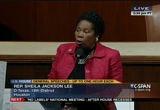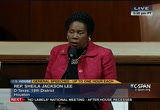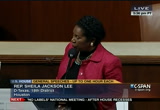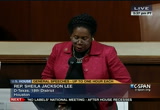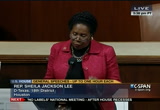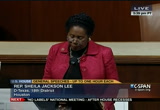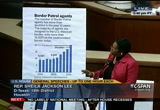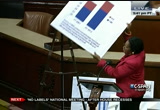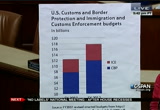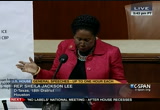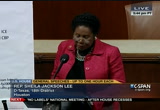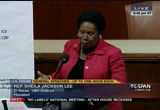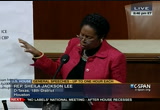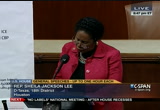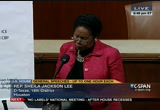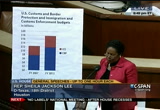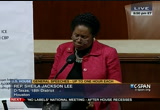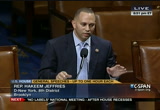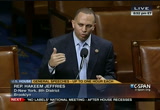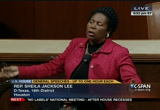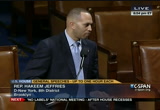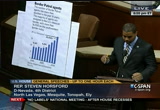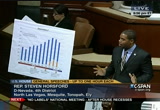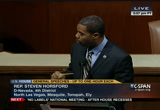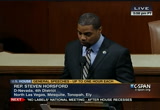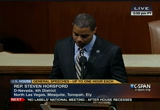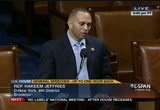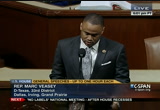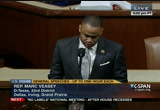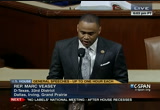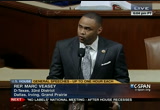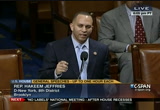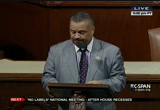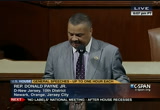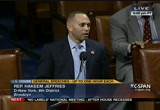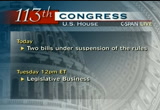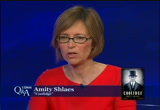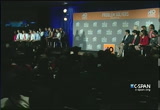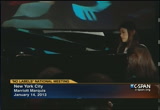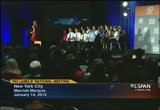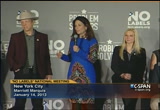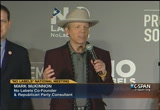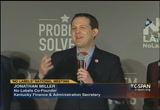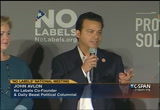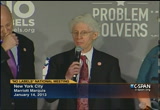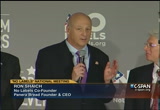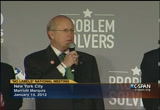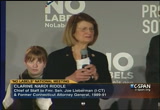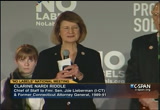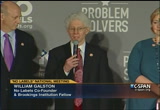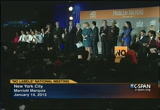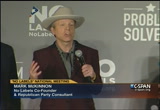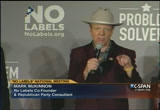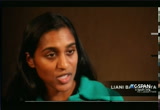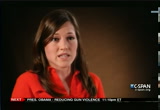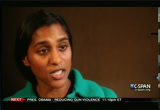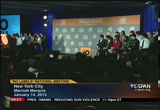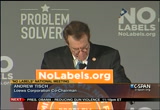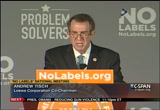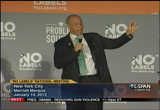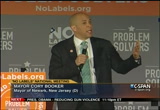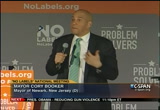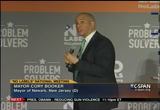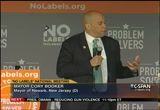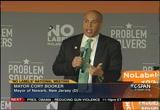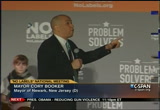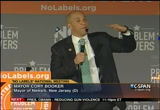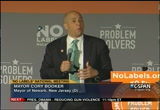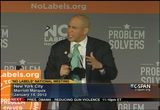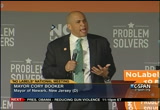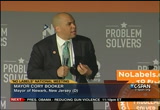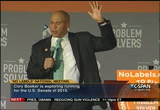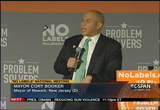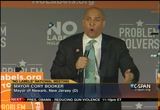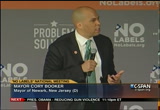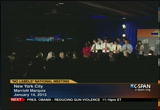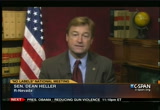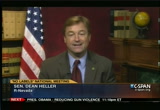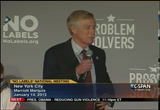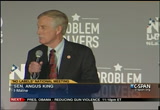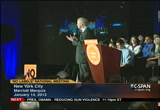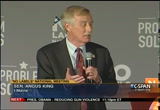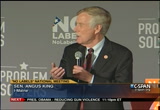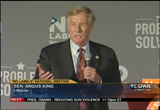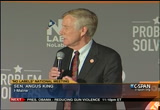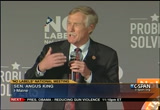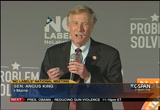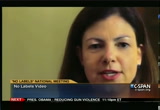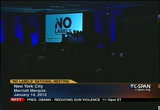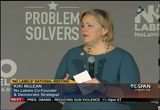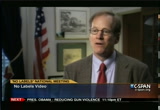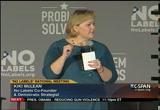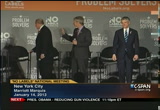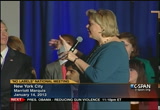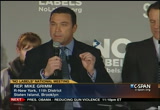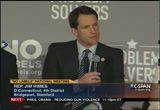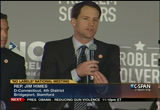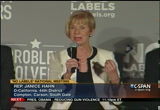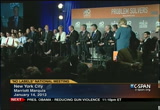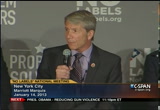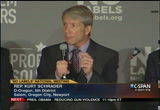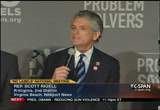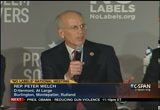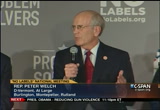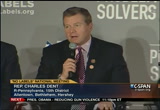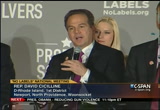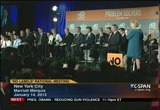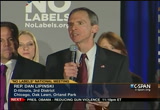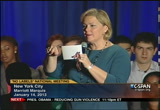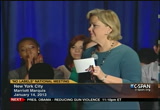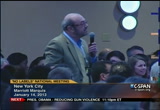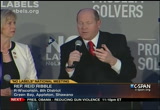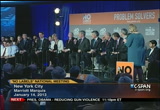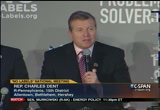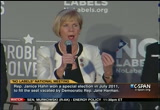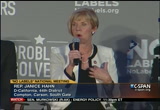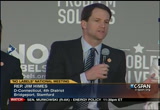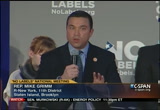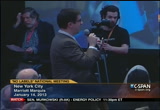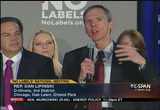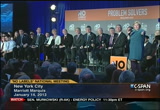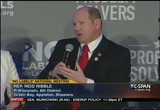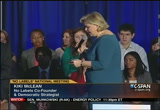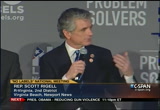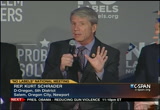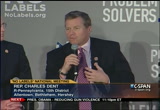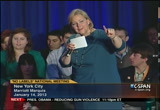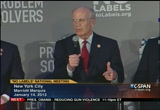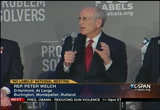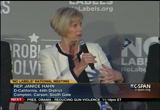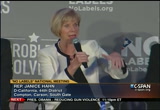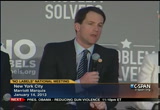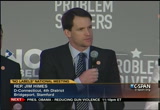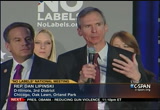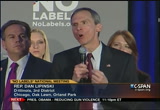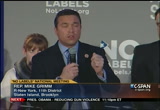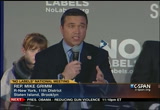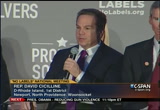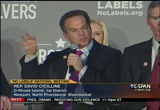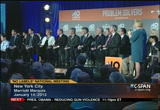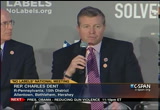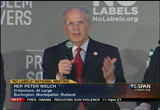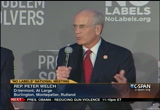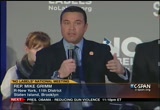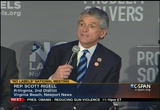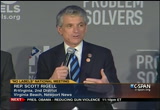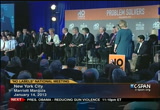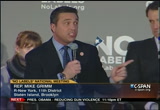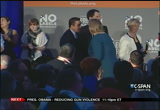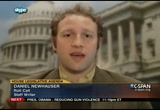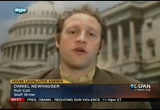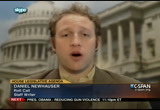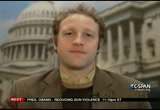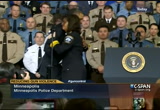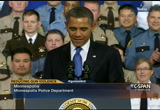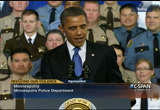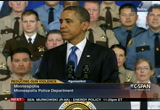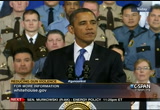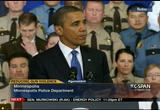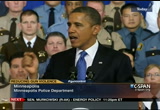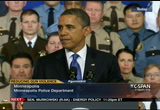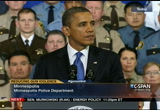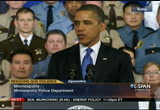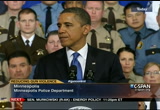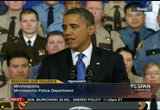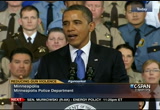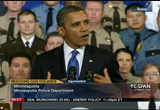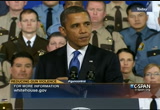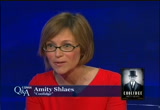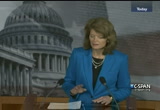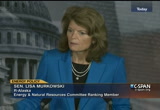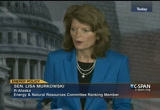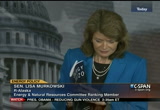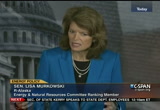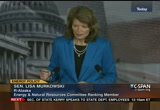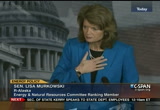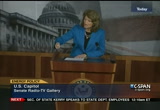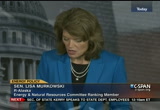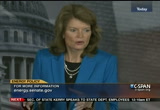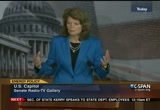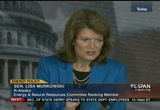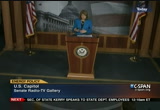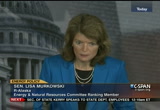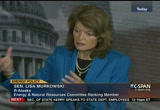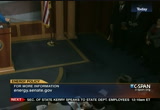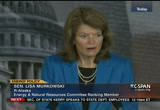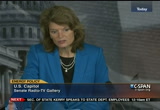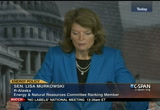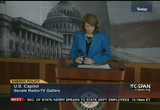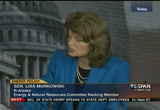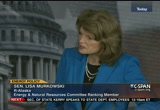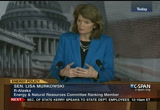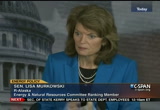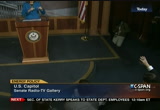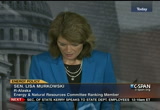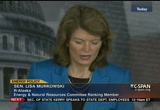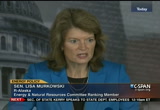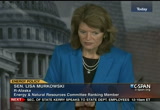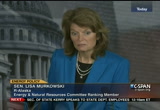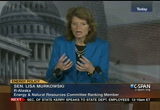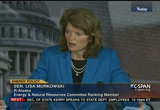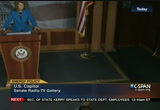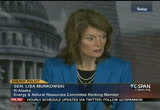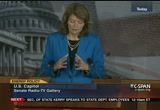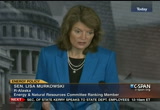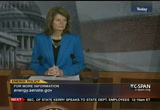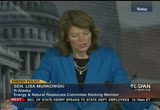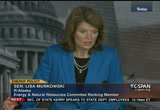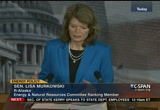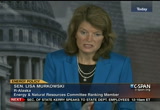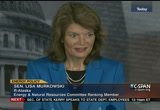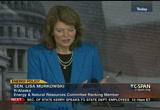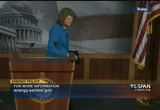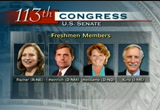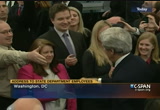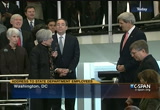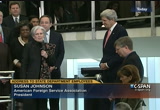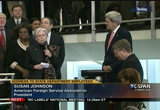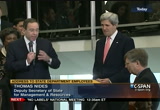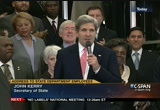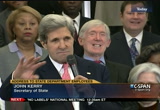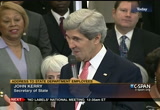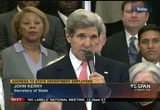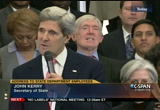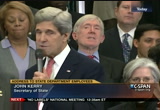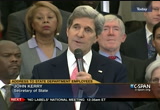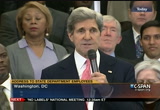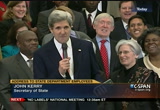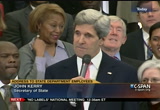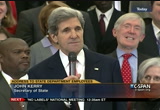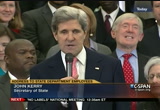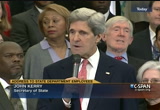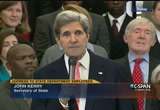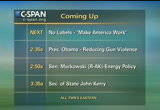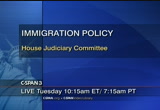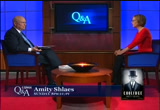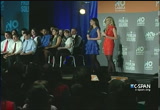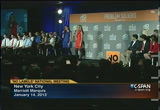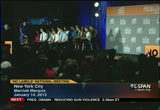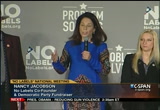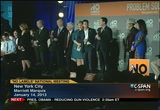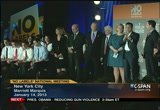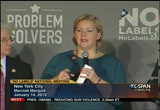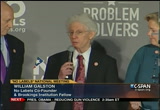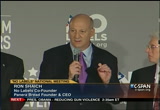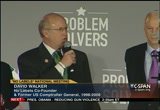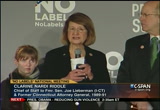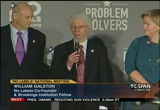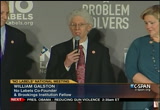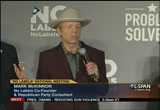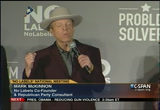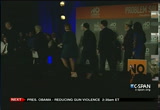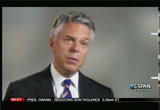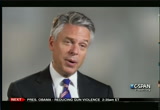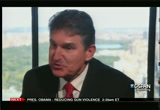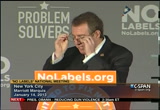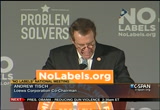tv Politics Public Policy Today CSPAN February 4, 2013 8:00pm-1:00am EST
8:00 pm
and they did make it to the next day. and to the next year. and about 10 years later they selected the first legislative body in the new world, in 1619. and the first act of that body was to go into the church in jamestown, to get down on their knees and ask for god's blessing and his wisdom and his guidance. it doesn't surprise us in the two years later when they would draft the first charter of the first constitution of virginia that they would have, as one of its primary purposes and its dedication, for the advancement and service of god and the enlargement of his kingdom. those years turned into decades and they moved that capitol from jamestown to williamsburg and it was a tough couple of years and they had great men of faith. some of them would spend 13 hours a day studying the bible, praying, and one of those individuals was a guy named samuel davies and he would get up often times at his church and preach and this lady liked him so much she would bring her sons and daughters to hear him on a weekly basis and her young
8:01 pm
teenage son would learn principles that he would talk about, about god and rights that came from god and not from men. that lady was sara henry and her son was patry heck -- patrick henry. when patrick was 29 years old, on his birthday, first day he was in the virginia general assembly, they were debating the stamp act and he was supposed to be there and be seen and not heard. he was a freshman. and he sat there and listened and it looked like virginia was going to do nothing and allow the axe to just slip right between their fingers. and as he listened and listens, he opened up a law book and there was a blank pages answered started making notes and finally he stood up and started talking about rights that we had. . another young man, thomas jefferson and said patrick henry was the greatest speaker he ever heard, he said no, the person he
8:02 pm
learned concepts of freedom was samuel davies. patrick henry, thomas jefferson would find themselves in the same virginia assembly but the port of boston was about to be closed and the king had issued that order and they came together with a makeshift caucus and said, what can we best do to help out in boston. you know what that group came up with? they said the most important thing they could do is ask the citizens of virginia to play for the people in boston. and they spent that night writing a prayer resolution. they looked back at old resolutions and wrote one and didn't know how it was going to be received. the next day, the virginia assembly voted unanimously and didn't change a word.
8:03 pm
the governor stormed in with a proclamation in his hand and dissolved the virginia assembly. they didn't like the word no, so they walked across the street, thomas jefferson, patrick henry and george washington and several others and they wrote a resolution that changed the world. a resolution that said that an attack on one colony was an attack on all of them and called on the first congressional continental congress. that congress as you know would meet, as mr. gohmert pointed out when they couldn't agree on anything else, one thing they agreed on was opening with prayer. second congress they had a second committee, and they wrote a declaration that would birth this country and we are proud in virginia, and the author was
8:04 pm
thomas jefferson. and said he didn't write any new ideas of principles but concepts that he heard from pulpits across the commonwealth, concepts that said this, our rights didn't come from any act, any king, any committee, but they came from the creator himself and if they came from him, they could never be taken away. they won the war and the freedom and in 1812, in that war, francis scott key pened that great poem that national anthem and he wrote what is right behind you and he said our motto will be in god we trust. as we went into the civil war, this congress declared that that motto, in god we trust could be on our coin. and in 1890, recount the great history of faith in this country and half a century later, the
8:05 pm
battle in normandy, franklin roosevelt asked for blessings. after that great war and our victory and we came back and asked where are we going to put our trust, atom bomb, resources in our economy, this congress said no, our motto would be in god we trust. and when i was a young boy, john kennedy facing the cuban missile crisis said this, the guiding principle of this country has always been, is today and will forever be in god we trust. mr. speaker, with that great history of faith, why is it that faith is under attack so much across this nation? well, mr. speaker, tune in, because in a few weeks, we will be back on this floor and we'll tell you who's doing it and why they are doing it and what we need to do to stop it.
8:06 pm
i thank you and i yield back my time. the speaker pro tempore: the gentleman yields back the balance of his time. under the speaker's announced policy of january 3, 2013, the gentleman from new york, mr. jeverries is recognized for 60 -- mr. jeffries is recognized for 60 minutes as the designee of the minority leader. mr. jeffries: i ask for unanimous consent that the -- be entered into the record a letter from the distinguished gentlelady from texas, mrs. johnson. the speaker pro tempore: without objection. mr. jeffries: today we are here as members of the congressional black caucus to weigh in on the important issue that confronts
8:07 pm
this nation as it relates to the need for comprehensive immigration reform. my honor and my privilege to represent the 8th congressional district anchored in brooklyn and parts of southwest queens, one the moist diverse districts in the country. a district that has blacks, whites, asians, latinos, immigrants from every corner of the world. i recognize in the capacity of my representation in that district the significance that immigrants have given both to the community i represent as well as for the city of new york, the state and the nation. i'm proud that we have been joined by several distinguished members of the congressional black caucus, which for more than four decades has been known as the conscience of the congress. and in that capacity, the
8:08 pm
congressional black caucus has year after year spent time trying to perfect our democracy and create a more perfect union. we confront that moment right now here in this great country of ours as we try and figure out how we deal with creating a pathway towards citizenship for the more than 11 million undocumented immigrants who are forced to toil in the shadow. we have been joined today as co-anchor for this next hour, distinguished classmate of mine from the great state of nevada, mr. horsford, who had the opportunity to be present while president obama delivered his
8:09 pm
remarks as it relates to immigration reform. and so i would like to ask mr. horsford if he might comment on the president's remarks and weigh in on the immigration debate from his perspective as a representative from an important state in nevada. mr. horsford: thank you, mr. speaker. i would like to thank my classmate and colleague and look forward to serving with him in this historic 113th congress as we work together to make this a more perfect union. i also represent one of the more diverse districts in the united states congress. our district, 25% latino, 16% african american, 7% asian american, 2% native american.
8:10 pm
it is a district that reflects both the usual and as well as the rural component and communities of our great state of nevada. in fact, congressional district 4 reflects the state of nevada and nevada increasingly reflects all of america. and so i believe that is why president obama decided of all places that he could visit, he visited nevada last week to discuss the fierce urgency of now in adopting a comprehensive immigration reform by this congress. the fact that nevada reflects the changing demographics of our country, but it also reflects the broken system which is our immigration system. and so as i listened to the president and as we honor today
8:11 pm
the 100th birthday of rosa parks, i reflect on these issues as a basic fundamental civil right, a human right that is guaranteed to us. so today does mark the 100th birthday of rosa parks, an icon in the struggle for justice, a woman who was known as the mother of the civil rights movement. as an african-american woman confronting prejudice and unequal treatment under the law, mrs. parks remarked that what pushed her to say no on that fateful day in montgomery was the simple fact was that her mistreatment was just not right and she was tired of it. she said, and i quote, i did not want to be mistreated. i did not want to be deprived of a seat i had paid for.
8:12 pm
it was just time. there was opportunity for me to take a stand to express the way that i felt about being treated in that manner. i had not planned to get arrested. i had plenty of -- to do without ending up in jail. but when i had to face that decision, i didn't hesitate to do so, because i felt we had endured that too long. the more we gave in, the more we complied with that kind of treatment. the more oppressive it became. it was not complicated. it was prejudice. it was unfair. and she was sick of it. she was tired of the constant drumbeat of injustice directing every minute of her day. she was tired of facing inequality in a country founded on principles, of liberty and justice for all. her acts of civil disobedience
8:13 pm
sparked a social movement that changed our country toffer, and she did it because it was just time. so today we honor her courage and her bravery. we remember her legacy and draw lessons from her actions. we take up the cause of promoting more just, fair and humane policy for all, because that's what we owe mrs. parks and all our civil rights leaders. it is our tribute to those larger-than-life pioneers. as dr. king said, injustice anywhere is a threat to justice everywhere. it is that creed of the civil rights movement that still motivates us today. so today, we take up the cause of joining arms with our immigrant brothers and sisters in that spirit. the time is now to lend a hand
8:14 pm
to those who confront injustice as a result of a broken immigration system. it is just time. for many undocumented immigrants in our country, they are waiting to start their lives. they are waiting to start a business. they are waiting to reunite with their families, often for years on end. and while they wait, children see their parents deported. students get stuck in an educational purgatory and can't attend college and better their lives in a country that trained them. and mothers and fathers can't provide for their family or care for their loved ones without keeping them in the shadows. so they can't wait any longer. we can't wait any longer. and as rosa parks said, it is
8:15 pm
just time. from africa to europe to asia, our dysfunctional immigration system is a disincentive to the best and brightest worldwide from coming to our great country. we throw talent away. we tear families apart. we show disregard for those trying to live the american dream. for far too long, we have put off comprehensive immigration reform, but now we are taking up the opportunity to do something about it. and we cannot let this moment pass. it is in that spirit that we hold today's discussion. we will not wait any longer. we have to continue strengthening our border, but we will act on comprehensive immigration reform without delay. we will crack down on employers, but we will make sure there is a pathway to citizenship for those who are here through no fault of
8:16 pm
their own and we will fulfill our heritage as a nation of immigrants and a nation of laws. justice, compassion and equal protection are our common cause. we have an opportunity to embrace the dinism that immigrants bring to our country and thousand is the time to do it. as i said, this is a civil rights issue. in fact, it is the civil rights and human rights issue of our generation. just like the civil rights issues of the 1960's that were fought by african americans and the women's rights issues before it. this is a civil rights issue that must be advocated by all, by all who believe in a sense of justice, opportunity and equality for every person. . we can move forward on immigration reform, for the
8:17 pm
good of our country and for the good of all of us as human beings. i yield back my time. >> i thank the gentleman from nevada. we've been joined by the gished -- distinguished chair of the congressional black caucus, the gentlelady from cleveland, ohio, representative marcia fudge. i yield her such time as she may consume. ms. fudge: i thank you so very much. it is indeed a pleasure for me to be with these young gentlemen here today. and i want to thank the gentlemen from new york and look -- the gentleman from new york and look forward to his leadership as he anchors this hour for the 113th congress and i'm certain that other members of his class will be joining him on a regular basis. so, mr. speaker, with that i thank him again. this is a lot of work which you know, to come down to this floor every week and talk about issues of importance to our nation. so i thank you. mr. speaker, i rise today to lend my voice to those of my colleagues on the importance of comprehensive immigration
8:18 pm
reform. the united states is a nation of immigrants. most americans trace their lineage beyond our borders. the promise of the american dream is what brings people from all corners of the world to this nation. this country was founded on the principle that here lies the land of opportunity. and that anyone can achieve success through hard work. but for the millions of undocumented immigrants, of hispanic, asian and african descent, living in america today, the american dream is just a promise. a promise they hope their children may one day realize. many immigrants are confronted with the same harsh realities that plague communities of color every day. namely racial profiling based on unreasonable suspicion, systematic criminalization in order to fill private prisons,
8:19 pm
economic injustice that holds many in the bondage of poverty. all examples of pitfalls that unfarrell yet intentionally trap -- unfairly yet intentionally trap, uproot and destroy far too many individuals and families. children in immigrant families also continue to struggle. according to the pew research center, there are an estimated one million unauthorized immigrants under the age of 18 in the united states and as many as 4 1/2 million u.s.-born children whose parents are unauthorized. these children live in fear. every year nearly 200,000 noncitizens, many with children who are u.s. citizens, are deported and torn away from their families. as families are torn apart children are forced to choose between separation from their parents or leaving the only
8:20 pm
place they have ever called home. how does america end the culture of fear among immigrant communities and help preserve families? first, we must create a pathway to citizenship that encourages not discourages legalization. second, we must address the issues of mass detention and unjust criminality of immigrant populations. third, our laws and justice system must place a premium on keeping families together. by creating flexible and equitable immigration policies that prioritize the unification and stability of immigrant families we strengthen the fabric that holds our communities together. lastly, as a former mayor, i would be remiss if i did not mention the important role our states and local governments will play in immigration reform.
8:21 pm
if undocumented immigrants come out of the shadows of society, our state and our local governments will need our support more than ever. dr. martin luther king jr. once said, history will have to record that the greatest tragedy of this period of social transition was not the clamor of bad people, but the appalling silence, the appalling silence of the good people. today we are in a period of social transition. as of the conscience of the united states congress, the c.b.c. cannot and will not stand by in silence. when history is recounted, the record will reflect the stance that the c.b.c. took in supporting comprehensive immigration reform. reform that not only includes individuals of hispanic and asian descent but also thousands of immigrants from within the african dies a pra.
8:22 pm
reform that dig -- iaspra. reform that dignyifies the struggle of family bonds. i urge my colleagues to unite behind comprehensive immigration reform. i yield back. and i thank the gentleman. mr. jeffries: i thank the gentlelady from ohio, the distinguished c.b.c. chair, for remember, what -- her remarks and her observations. i think there were several important points that were raised by our chair, congresswoman fudge. first, sometimes the immigration reform debate has been characterized as perhaps just a latino issue, at other times it's been characterized as perhaps an asian issue. there are times that the immigration reform debate is characterized as an eastern european issue. but really immigration reform is an american issue. it cuts to the heart of who we are and what we will become. it affects every community. and as congresswoman fudge
8:23 pm
indicated, there are black immigrants in the united states to whom the issue of creating a pathway toward citizenship is extremely important. it's estimated that there are three million black immigrants in this country, approximately 400,000 undocumented ones. who are these immigrants of african descent? some are from the caribbean, 2/3 of which from nation states such as jamaica, trinidad and hatey. others are from the -- hatey. others from -- haiti. others are from the continent of africa, from sudan, from ethiopia. i'm pleased that we've been joined by the distinguished the gentlelady the ninth congressional district in new york who represents one of the largest immigrant populations for a congressional district
8:24 pm
not just in the city of new york but anywhere in this nation, she's been a dynamic leader on this issue and it is my pleasure to yield to her such time as the gentlelady may consume. ms. clarke: mr. speaker, i rise today to add my voice to the c.b.c. and amplify the message of support for true and real comprehensive immigration reform. first, i'd like to thank our newly elected colleagues -- colleague, the gentleman from brooklyn, new york, congressman jeffreys, and the gentleman from nevada, representative horsford, for hosting this hour. mr. speaker, i commend president obama for his commitment to comprehensive immigration reform and i reaffirm my commitment to working with his administration and our colleagues to make true reform a reality. having said that, i want to challenge the president and all
8:25 pm
of our colleagues to expand upon the face and the voice of immigration, adding new dimensions to the unfolding debate. when two major immigration speeches such as those that president obama made in el paso, texas, in 2011 and last week in las vegas, nevada, in mr. horsford's part of the country, omit the contributions of immigrants from the continent of africa it paints an incomplete picture of the idealized gorgeous mow sake or melting pot, if you -- mosaic or melting pot, if you will, that the united states of america represents. we must embrace the diversity of those who are impacted by reform and understand that this debate cannot solely rest on the shoulders of our latino sisters and brothers. the stigma tiization of the
8:26 pm
latino -- stigmatiization of the latino population as the target of the immigration population has resulted in a skewed depiction of the true diversity of the immigrant population resident in our country. we have immigrants represented from almost every nation around the world and we must recognize all of those who are building communities and strengthening our nation. since 2009, i've been working with my colleagues to diversify the voice and the face of the immigration debate. the warden of a broken system does not encumber one group of citizens alone. there are approximately three million immigrants from the african dies a pra in the united states, the vast majority of whom entered the country with legal documentation. the impact of immigrants of the african area, from the couldn't nept of africa.
8:27 pm
the caribbean region, south and central america, has been massive in scale. as a representative of the ninth congressional district of new york, i am proud to serve a very significant caribbean, south and central american and continental african immigrant community whose immigrant experience is as diverse as the countries from which they have come. in fact, i represent one of the most diverse immigrant-rich districts in the nation, with people who have come from the middle east, south asia, asia, russia, the eastern european nation and it's a virtual united nations. many entered our shores like my parents to pursue careers in medicine, science, education and other professions. many are proud business owners of law firms, restaurants, grocery stores, shipping companies, hairbraiding venues.
8:28 pm
there are those who come as asylum seekers, fleeing the tumult of war, famine and genocide. no matter their reason for immigrating, they've come to the u.s. to be productive, tax-paying members of our civil society and to attain the american dream. unfortunately immigrants of the african area like so many groups around the world are dealing with backlogged immigration processes. families being ripped apart, falling out of status because they have aged out of the legal immigration process. racial and status discrimination, unfair criminal aggravated felony laws, depour tration processes that violate -- deportation processes that violate rights and insecure and prohibitive student visa programs, limited access to work permits and much, much more. you see, many immigrants arrive
8:29 pm
on our shores during a time of their lives when they are the most productive. any delay in processing these individuals, in bringing them to the floor, deny us the opportunity to access their talent, their skill and their ability in the prime of their lives. additionally african-americans, those descendents of the slave trade, whom i fondly call long-time stakeholders of this nation, have been affected by the broken system as well. working class americans of all backgrounds, races and ethnicities are adversely affected with a broken immigration system. they are facing depressed wages due to unscrupulous and illegal corporate hiring practices. urban communities aren't being adequately counted by the census and other surveys resulting in the reduction of adequate government services
8:30 pm
and federal resources to meet the needs of the actual population in the communities. and increasing the strain on current public services. urban communities are exposed to more crime as the undocumented are more reluctant to report crimes and african-americans are dealing with increased racial and status discrimination as many are subjected to interrogations based on citizenship. . this is why as a child of the caribbean, second-generation american and a sister of the african diaspora, i believe it is my duty and that of the congressional black caucus to ensure that the voices of immigrants of the african diaspora will be at the forefront, shoulder to shoulder with the congressional hispanic caucus and the caucus of the
8:31 pm
asian and pacific islanders. that the voices of the immigrants of the african diaspora will be heard. we will make sure that this debate is as die versus of the population it encompasses. the effectiveness of the immigration reform debate will rely heavily on the diversity of its support and that's why i call upon my sisters and bothers within the african diaspora to join with the members of the c.b.c. and myself and others in making sure our voices are heard and our needs are adequately addressed. mr. speaker, the time is now to pass a comprehensive bill that includes streamlining the immigration process, a humane enforcement strategy that address the needs of children and other vulnerable people. use of alternatives to detention, create enforceable detention standards and
8:32 pm
safeguard our investment in our dream act kids and outlining essential due process reform. our national security is at stake. our moral standing in the world depends upon it and the american people, many of whom are first and second generation immigrants have demanded it. if we turn our backs on those law-abiding contributors to our civil society that come to our shores only to embrace the american dream to labor and rebuilding our nation and streeng then our economy, to serve honorably in our military, we turn our backses on ourselves and our future. you don't have to believe me, just ask the people in japan where population growth has been stagnant as a result of a prohibitive immigration policy. it is time of people of goodwill to stand for those who fear or
8:33 pm
who are unable to stand for themselves. let's stand together for comprehensive immigration reform. and i yield back. and i thank the gentleman. mr. jeffries: thank you, congresswoman clarke. the congressional black caucus consists of 42 members representing a variety of communities all across this great nation. we have been joined today by two representatives from the lone star state, one of whom, sheila jackson lee, has distinguished herself in many different areas, but has been a thoughtful leader in the area of comprehensive immigration reform and currently the ranking member on the house committee on homeland security subcommittee on border and maritime security. and also is a senior member of the house committee on the judiciary and the important
8:34 pm
subcommittee on immigration and border security. we are thankful she is a long time champion of a fair and humane immigration system. and i yield the floor to congresswoman sheila jackson lee. ms. jackson lee: i would like to thank the distinguished gentleman from new york and the distinguished the gentleman from nevada. and i particularly want to thank them for hosting this vital discussion, this special order and pay tribute to them for doing a service to the nation.
8:35 pm
when we speak on the floor of the house and we come from different states, new york, nevada, texas, ohio, i think we have just about covered america. it has an amazing impact on our colleagues and certainly constituents. so we all owe you a debt of gratitude for the forward thinking and particularly since the day has a double meaning, one, this is the 100th birthday of rosa parks. she's often called the mother of civil rights. then our president over the last couple of weeks and as the gentleman from nevada knows, spent time with him, to speak eloquently about the need for this pathway of access to legalization going forward.
8:36 pm
so i'm grateful again for your willingness to host this and to begin to surge forward, collaborate with members of the congressional black caucus and giving them information and collaborating with the asian-pacific caucus, the caribbean caucus and the hispanic caucus. i think there are three of us now that we have a new caribbean which a number of us serve and as well, the african diaspora, which includes our brothers and sisters that have been mentioned on the floor. it's my effort today and to thank both the gentlemen from new york and nevada for some potent posters that i hope i
8:37 pm
will share with all of you. let me share both words from president obama and some abbreviated words from dr. martin luther king, but the words from president obama stated as it relates to the question of immigration reform that our journey is not complete until we find a better way to welcome the striving hopeful immigrants who see america as a land of opportunity until bright young students and engineers are enlisted in our work force rather than expeled from our country. the important part of this discussion is to make sure that the landscape of immigration reform is a landscape of many faces, many heritages, many backgrounds, many regions in the united states, many continents and that it is important for all of us to have a commitment to better opportunity for all. but as we do that, i think
8:38 pm
education is crucial, for as this discussion goes forward, i want my friends to know that there will be moments of great contention. there will be moments of disagreement and there will be moments of misrepresentation. it is important for the broad diaspora to understand that we are in this leaking boat together and when we utilize the term of civil rights or use rosa parks or speak to the words that dr. king said on april 3, 1968 that said that he could see a promise land and he knew we would get fl someday. i cannot imagine in the 50th year of his "i have a dream" speech that african americans who came first to this country as saves could then join with others in fishing boats, airplanes and walk across the board for greater opportunity
8:39 pm
and make america, the great nation, the promised land of which he predicted. it is not to take from someone else and give to someone else or not diminish the civil rights struggle of the americans' struggle but to say we have a common ground and that is the way we are going to pass immigration reform. if you are a southerner and republican from the south, you have as much invested in america as you may be from the wonderful district that are represented on this floor. and until we understand that in the house, until the speaker understands and accepts it, this is not taking away or undermining anyone's view of america, it is to say that the view of america is the promised land that so many come for. it is a recognition that americans have come from the 1800's when the irish came because of the famine, italians,
8:40 pm
other groups. large numbers of hispanics, asian americans, south asian americans, those who come from the pacific area, pakistan and india and bangladesh, those who come from the caribbean and africa, they have all come and we have to recognize that. one of the issues that seems to be coming up over and over again as we look at this issue -- and i will specifically speak to the senate's proposal and talks about the 11 million undocumented individuals. the path to citizenship will only take place if the borders are secure. let me be very clear that great progress has been made over the clinton administration, moving into the bush administration, george bush, and then onto the obama administration, particularly in the obama administration, because you can begin to see any suggestion that we have not worked to secure the
8:41 pm
border is based on lack of information and lack of facts. i thank my colleagues for a poster that in fact says the number of border patrol agents has more than doubled in the past 10 years. when i first began writing legislation in 2003, 2004, 2005, we were short changed on border security agents. working with the senate, working with the president, we funded the increase of border patrol agents and we see now that the majority of agents are assigned to the u.s.-mexican border, 16,000 and more that are basically at the border now. i think we can do more, if you will, for the northern border and i look forward to working with my chairperson of the subcommittee on that issue. but we cannot let the discussion get bogged down in talking about, we can't provide some access to citizenship.
8:42 pm
i call it earned access to citizenship. but here on the senate proposal, it talks about securing the border. i want to be able to be responsive to their concerns, but they should also look to the facts and between i.c.e. and c.b.p., you can see the increase in amounts of money that have gone up in the billions of dollars, now close to $18 billion between i.c.e. and c.b.p. c.b.p. being a little under $12 billion, that we have truly under the obama administration been serious about border security. in fact, there is a poster board here that suggests that the deportations have gone up. that is not the right way to proceed. my point is there must be common ground. in the senate they talk about young undocumented immigrants
8:43 pm
brought to the u.s. as children will have a direct pathway to citizenship. those are the dream act individuals and those are the talent we are throwing away, young people in college contributing to society who can help bring their families, are forced to deportation. and i thank the president for his executive order that provided ajudication for dream act youngsters as a basis of saying that the i.c.e. should enforce deportation on those who are a threat to our community and prioritize those -- from those who are here not doing us harm and being educated. the senate proposal talks about young people and the family reunification and allows immigrants performing lower-skilled occupations to
8:44 pm
enter the country. i don't like the idea of lower skills. people come to work and if they have a skill, they have something to contribute. that is the basis upon which we should look at it. for the congressional black caucus it is important to say our communities suffer unemployment more so than others, it is important that the employer has looked very hard for a person who is eligible for that job here in the united states. that's how we educate our population. that's how we bring together the right kide of collaboration. high skilled individuals should be those in historically black colleges, hispanic-serving colleges. we should encourage to be farther of engineering, science and math. however when there is an immigrant that is graduating from our top universities, we should not ask them to leave.
8:45 pm
it is very important to do so. and we should ensure that they have opportunity. the senate -- the president's general path to citizenship provides a pathway to citizenship and they can register for provisional legal status and his point is, that we should join in, we should not let border security get in the way of making sure we move forward on a legal status process. young people, who, again, who were brought here as children should have an expedited path to citizenship by going to college or two years in the military. slight differences that we can find a legal ground. increase the percentage of family-sponsored from 7% to 15%. this goes to a complaint that you will hear from those in nevada, those in new york, those in your very diverse districts, they want to be reunited with their family members. and one of the most stark things
8:46 pm
that happen to us who visit with immigrants, what about the immigrant who wants to go home for a dying relative or the relative wants to come because there is a dying relative here in the united states? i had that happen in my district. i had a south korean student who was shot on the streets of houston and he became paralyzed and when his father came here, he was held and detained and we got that resolved. but we must find a way to have this punishment that this pain they are experiencing, we must find a way to be able to work on this in a productive and smart manner. . we have not been slouching as it relates to border security -- slouches as it relates to border security. i want to speak to the diversity visa program which is a target of our friends who may
8:47 pm
be did not whands that means, but -- did not understand what that means. it is to allow people who didn't get into the normal visa system. it has proven to be a way of helping those who come from the continent of africa. those who come from a number of other areas where it is very difficult to get a visa. nearly 15 million people representing about 20 million with family members included are registered late last year for the 2012 diversity visa program under which only 15,000 visa winners were to be selected. that shows the intensity of the diversity visa. and some want to get rid of it. it's a lot of african immigrants. it's a lot of people trying to come to be with their family. diversity visa immigrants succeed and contribute to the u.s. economy. according to the congressional research service, in f.y. 2009, diversity immigrant visas were 2.5 times more likely to report
8:48 pm
occupation. the founder of it said that the heart of the definition of america is what this program is about. all nationalities are welcome. ambassador johnny young said the program engenders hope abroad for those who thank are often too often without it. hope for a better life. and so i hope 's with -- as we look at immigration reform we will not attempt to eliminate opportunities to bring families together. finally, with respect to security issues, there's no significant evidence of a security risk with the diversity visa. the g.a.o. found in 2007 no documented evidence. these points about the issue of where we can come together and where there are distinctions is to raise the factor of how serious and difficult this process may be. the congressional black caucus will be pivotal in its role. one, because it is the conscience of this congress. two, because we have the uncanny ability of seeing from a broader perspective what we have gone through in our lifetime. what our communities go through. we've seen discrimination. and we are sympathetic and
8:49 pm
sensitive to how we can help others. and so i think the challenge is, as we proceed on this process, that all of us be included in this discussion. that the working group includes members of the congressional black caucus and that, as we encourage legislation to come to the judiciary committee, which is a committee that i sit on, the immigration subcommittee, that bill love ten chairs and which i'm second on that committee, and as it goes through homeland security, where ranking member mr. thompson and mr. mccaul share the leadership and judiciary, as mr. conyers and mr. goodlatte, where i am the ranking member of the board of security committee, that we through the congressional black caucus find a way to uphold the values of our ancestors, hold the values of the pioneers and leaders that have traveled to the journey of civil rights, that we can see the plight and the pain of those who come now. i want to say in closing that as a member of the congress, having the privilege serving
8:50 pm
the 18th congressional district, even in a city like houston, it is enormously diverse. having a large number of counselors, officers and people who have come from all walks of life, who have come through our doors in the 18th congressional district, begging for help, pleading for their children not being able to be deported. and i would say to my colleagues, you have not -- and those of you who come from this diverse background, fully understand what it's like to hear a mother's shrill scream in your office when you said to them that we're going to stop the deportation of your child. we've all understood that pain. if we've encountered immigrants who do nothing and want nothing more than to live the american dream, who are paying taxes, building houses and working for the betterment of us all. serving in the military and sheding blood. for this reason i think it is crucial that we try to overcome the hurdles, the differences of opinion, the tension that will
8:51 pm
rise vapped a commonplace to start from and a common ending. comprehensive immigration reform will not hurt those of white house stand on this floor and we -- those of us who stand on this floor and we will not let it hurt those who we represent. it will be a focused road map for all of us to work for a great and wonderful promised land that martin king dreamed about and spoke about a few years ago. with that i yield back to the gentleman. mr. jeffries: i thank the gentlelady from texas for her very poignant observations on a variety of different issues concerning the comprehensive immigration reform issue. i'd just like to amplify for a moment one point that was made as it relates to the significant -- significance of the diversity visa lottery program. it's a program that in its conception --s i eppings is designed to make sure that -- in its inception is designed to
8:52 pm
make sure that immigrants from under-represented parts of the world have an opportunity to come to america and participate in the american dream. and in the context of this diversity visa lottery program, approximately 20% of the african immigrants who are here in this country are here as a result of participating in that program. it has been an instrumental vehicle for ensuring diversity as it relates to the presence of immigrants from the african continent who, by the way, statistics have shown tend to be more educated in their attainment of college degrees than any other immigrant group. and as a result they are very much contributing to moving this society forward and for that reason i believe it will be important for the c.b.c. to continue to stand up for this program as we move forward with
8:53 pm
comprehensive immigration reform. ms. jackson lee: would the gentleman yield? for just one quick moment? i want to applaud him for that and add two groups that we did not mention yet. that will really be impacted by comprehensive immigration reform. liberians who came here on deferred enforcement. who are now still in limbo and work with us over the years and we've been, if you would say advocates for them. and haitians who have a distinctive pathway into citizenship, who have certainly been contributing. fought with us in the revolutionary war. and you're absolutely right. the diversity visa has been a lifeline, not for terrorists but for hardworking immigrants. i hope as we debate this mountains of tension or disagreement, that we can find common ground to include all these groups that will help better america and grow america strong. thank you for that and i yield back. mr. jeffries: thank you. one of the things we hope to accomplish today as we move forward in the context of
8:54 pm
advancing this immigration reform debate is making sure that the facts surrounding the issue of immigration are well known. this is a nation of immigrants and it's a nation of laws and some have articulated the concern that we must secure the border before we can move forward and create a pathway toward citizenship for those who are in the country and undocumented. much has been made about the southwestern boarder in particular and the gentleman from nevada, i believe, has some statistics that he can speak to as to the progress that has been made in securing the border, points that were also made by the gentlelady from texas.
8:55 pm
mr. horsford: thank you, mr. speaker. again i'd like to thank the gentleman from new york for yielding and to ex pound on some of the points that the gentlelady from texas made, ms. jackson lee, in regards to the tremendous progress that has been made on strengthening the border. she touched on the doubling of the number of border patrol agents from 10,000 to 20,000, 2 is,000 agents -- 21,000 agent in just the past year. that's a doubling since 2004 of resources.
8:56 pm
and this is tremendous in that it actually is the largest per-year enforcement of any other federal law enforcement combined. it's 17.6 -- $17.6 billion worth of enforcement on our border. and so progress has been made. many -- half of these deportations have been to individuals who committed crimes, illegal crimes, and were deported for that reason. but let me also touch on another element which the gentlelady also discussed. and that is immigration and the history of immigration policy in our country has always focused on the family. and keeping the family together. and reuniting family members.
8:57 pm
and so we have to be careful when we talk about deportation, what that means for individuals. because this is a human rights issue. in my district, in congressional district four, i met with a group of citizens on sunday before the president came and there was one family there who explained to me a situation where the family member, the mother had been deported and the children now are in foster care. they cannot be reunited with their family because of the status issues and that is something that is having a human toll because we have a broken immigration system that must be fixed. and that has always been a cornerstone of our immigration policy in this country. the focus on keeping our families together, not just on labor or economic issues, which should be at the forefront as
8:58 pm
well. and so enforcement has been a big cornerstone and should be a major cornerstone of the policy going forward. but the pathway to citizenship is the cornerstone and i believe the congressional black caucus, as a stakeholder in this discussion, working with our colleagues on the other side and in the other chamber must articulate why there cannot be a precondition of a test on border security in order to provide for a pathway to citizenship. that so many individuals depend on. let me also discuss one other element of comprehensive immigration reform that is necessary and it's important to my district in congressional district four and that's the focus on enhancing travel and tourism. the administration under president obama is committed to increasing u.s. travel and
8:59 pm
tourism by facilitating legitimate travel while maintaining our nation's security. consistent with the president's executive order on travel and tourism, the president's proposal securely streamlines visa and foreign visitor processing. it also strengthens law enforcement cooperation while maintaining the program's robust counterterrorism and criminal information sharing initiative. it facilitates more efficient travel by allowing greater flexibility to designate countries for participation in the visa waiver program. which allows citizens of designated countries to visit the united states without obtaining a visa. and finally it permits the state department to waive interview requirements for certain very low-risk visa applicants, permitting resources to be focused on higher-risk applicants and creates a pilot for people are
9:00 pm
um visa processing. so these are -- premium visa processing. so these are all of the exronets -- components that have to be part of the comprehensive immigration reform. these are the tenants by which the congressional black caucus, working with the congressional hispanic caucus and the asian-pacific caucus, believe are the cornerstones and the principles that any comprehensive immigration bill should be passed. and i waive back to the gentleman. . >> thank you, mr. -- mr. jeffries: thank you, mr. horseford, we have been joined by congressman vecsey, who represents a diverse area in the dallas area. it's my honor to yield to the gentleman from texas. >> thank you, mr. jeffries. i want to thank my colleague, ha -- mr. vee cease: i want to
9:01 pm
thank my colleague from the great state of new york and mr. horse -- mr. vecsey: i want to thank my colleague from the great state of new york and mr. horseford for their work on this issue. i thank you for the opportunity to address the chamber on the very important topic of comprehensive immigration reform. mr. veasey: i would also like to express my gratitude to the congressional black caucus for their work on this issue and for allowing me to continue this urgent and meaningful discussion. as members of congress it is our duty to be the voice of our constituents by creating and passing legislation that addresses their concerns. for much too long, 11 million voices have waited for congress to work together on comprehensive immigration reforms in neighborhoods like the ones i represent in dallas and fort worth, and oak cliff,
9:02 pm
which is in dallas, out on the north side of fort worth, this is an issue that is very important not only to those neighborhoods but to the neighborhoods in the entirety of the district i represent. the consensus on this issue has been -- has never been stronger and i'm proud to see members on both sides of the aisle working together and finding a practical solution to this problem while president obama leads the way. i applaud comprehensive immigration reform efforts, including the proposals put forth by the president and bipartisan groups of senator which is call for protecting our borders while respecting the unity and sanctionity of our -- and sanctity of our families. our undocumented immigrant community includes dreamer schoolchildren failing in math and -- exceling in math and science, wanting only to attend college in the only country they've ever known. and hard working men and women only trying to make an honest
9:03 pm
living and provide for their families. comprehensive immigration reform is about accountability and responsible public policy. it is not feasible, economical or moral to propose the deportation of 11 million people that are living and working hard in our country. what reform calls for is responsible public policy that provides certainty to employers that people wanting to work, are legally eligible to do so, thereby bringing a significant population of our country out of the shadows. mr. speaker, our borders are more secure than ever before. border security is a serious issue and we must continue to enforce our laws, but we can also enact a fair immigration system by working together, providing appropriate protections to undocumented workers, including fair wages and safe working conditions, is
9:04 pm
the right thing to do to ensure the development of our economy and our nation's security. as congressman from the dallas-fort worth metroplex i understand the necessity of bipartisanship on this issue. my first days in office have been devoted to relationships and coalition building on both sides of the aisle. i look forward to continuing those efforts and will not stop until we achieve a fair and comprehensive immigration reform plan. i will work closely with my friends in the congressional hispanic caucus, the congressional black caucus and all my colleagues that would like to join this effort. the voices of those in my district and across the country are being heard. it's time to make comprehensive immigration reform a reality. thank you. i yield back my time. the speaker pro tempore: i thank the gentleman from texas. as we he indicated -- mr.
9:05 pm
jeffries: -- mr. jeffries: i thank the gentleman from texas. it is time to address this in a manner that addresses security concern bus also recognizes that several years ago, several benchmarks for set forth for security measures to be reached in order for comprehensive immigration reform and a pathway toward citizenship to be created. six years ago, there was a call for at least 20,000 border protection agents. right now there are 21,000 -- there are 21,400 border protection agents. six years ago, there was a call for a fence to be constructed along the southern border of approximately 670 miles, although our border security folks have said they believe a fence would be adequate that is 65 miles. -- 652 miles. 651 miles of which have already
9:06 pm
been constructed. there was a call for video surveillance assets, cameras and radar, deployed along the borders of this country. the call was, six years ago, for 105 such video surveillance assets. mr. speaker, right now, there are more than 250 deployed in the united states of america. we have met or exceeded the security benchmarks that have been set. that's why it's time for us to move forward with comprehensive immigration reform. we have also been joined by another distinguished colleague of ours, the gentleman from newark, new jersey, and i yield such time as he may consume. >> thank you, mr. speaker. let me first say thank you to the gentleman from new york, the gentleman across the river. we are looking forward to
9:07 pm
having a great working relationship and also the gentleman from nevada who has distinguished himself very early in this congress as well. let me just say, as we debate this issuing we must not forget that we are a nation of immigrants and it is our rich history of immigration that has strength thnd country generation after generation. mr. payne: yes, we must secure our borders but we must also recognize there have been a recovered number of deportations and seizures over the last four years. this issue of border security cannot be used as a fear tact toik prevent progress. in my district, people migrate from all over the globe, not just from latin america but from the caribbean and africa as well and asia. and they are all in search of the same thing, in pursuit of the american dream. children who are brought here through no fault of their own
9:08 pm
and think of thems as americans wait in limbo. so we have a moral only fwation to fix our broken system. it is not only the right thing to do, but it's the practical thing to do. over 11 million undocumented workers live in our communities, go to our schools and work among us every day. it is time for congress to provide these 11 million people the chance to come out of the shadows without the specter of deportation hanging over their heads. it is also time -- the speaker pro tempore: the gentleman's time has expired. mr. jeffries: thank you for the opportunity, i want to thank the distinguished members of the c.b.c. including my colleague congressman horseford for his eloquence and the facts he's brought to bear and thank you for this opportunity, i yield back to you the balance
9:09 pm
of our time. the speaker pro tempore: the gentleman's time has expired. mr. jeffries: i move that the house do now adjourn. the speaker pro tempore: the question is on the motion to adjourn. those in favor say aye. those opposed, no. the ayes have it. the motion is adopted. accordingly the house stands adjourned until 10:00 a.m. for morning hour debate.
9:10 pm
>> later, senate energy committee ranking member senator murkowski reveals his ideas for energy policy. then john kerry speaks to state department employees. >> a single thing that coolidge did that we want to remember is, when he left office, the budget was lower than when he came in. that is the story for us now. how did he do that? the economy grew a lot. maybe more than three percent sometimes. unemployment was below five percent. the budget was balanced due to his own money. had he managed to keep -- the budget go lower. how did that help the economy?
9:11 pm
he got the government out of the way of the economy. >> tracing the life of the 30th president of the united states in oakland coolidge." "coolidge."t -- oh quot >> they heard from newark mayor cory booker immigrants leaders. democratic senator joe manchin of west virginia and former gop presidential candidate jon huntsman. this is two hours. >> ladies and gentlemen, please welcome marianne huntsman and abby huntsman. [applause] family"] ♪
9:12 pm
>> we are family. we are so excited to be here today and to be a part of this launch. we cannot think of to do better people than our father, governor huntsman and senator joe manchin to be a part of this kickoff for no labels. [applause] as our generation looks to the future, this just gives us hope. thank you all for being here. it is great to be here. i will say that democracy was not supposed to be easy. it is through debate and conversations just like one that our dad and senator mansion are wanting to have that really tackle the issues that need to be tackled. we are so excited for our generation about this organization. there is no better way to kick it off again by singing an arrangement of "god bless america" that we put together.
9:13 pm
9:14 pm
9:15 pm
9:16 pm
9:17 pm
mckinnon, jonathan miller, john avalon, kiki mclean, bill, ron, david walker and clarin. ♪ for you"]there ♪ [applause] >> thank you everybody. we are so thrilled you are here. without we would all take a moment to share on this idea got started. and where we are going with it. if that started -- it got started with a feeling. -- a feeling shared by people on this stage. it spread to many of you in this
9:18 pm
room. that something was not right in this country. that gridlock and hyper partisanship was getting our country stopped. we decided that we needed to coalesce all of you into a national movement so you had a voice, so washington could hear you. >> two years ago, some of you were here when we launched. today we have arrived. this is really exciting to see everybody here today. we start off by organizing, county by county, state by state, and we start off with hundreds of people. that turned into thousands. now it has turned into hundreds of thousands. washington is starting to get the message. the great thing about the selection is that -- this election, is that people heard your voice. problem solving is a message that washington is hearing and responding to this idea of hobbled solvers we are putting together. it is all about an attitude,
9:19 pm
that is what you bring to the table. we are going to take it out and build on it and make problem solvers work. thank you for being here. [applause] >> no labels welcomes all americans. whether you are on the left or the right or anywhere in between. as long as you are willing to search for common ground. we realized that this is not going to be easy. there are real philosophical differences between republicans and democrats that cannot be papered over with civility. austin didn't broken right now. congress's approval is somewhere below brussels brother lindsay lohan. it is slightly above root canals and duke basketball. [laughter] i am from kentucky, sorry about that. what the liberals is doing is coming up with an effective strategy to fix washington. we have taken a look at what the roots of the dysfunction are. we are coming together to come
9:20 pm
out in two ways that we can make a difference. >> that began with all of you. organizing a citizens movement, grassroots, powered by social media. 1500 of you signed up to join us in new york today, but hundreds of thousands of you across the country. that is a powerful message that washington is starting to get. a second part is to empower the problem solvers in washington to start doing the right thing. start reasoning together. that is happening. there are 1000 different organizations in washington, each devoted to pushing a specific special interest. we have all sorts of interesting differences. we are unique in that we are advocating for the national interest. we are trying to create a broader perspective. all the important issues he faced, immigration reform, and on and on, those ideas are out there but they are sitting on shelves at think tanks gathering dust area about what we can do is empower those ideas to meet
9:21 pm
action. encourage folks in washington to put those ideas in place to defend the common ground that exists on these issues and build on it. [applause] >> all the moms and dads in this audience and anyone who loves a child like i love my wixon and might and he -- woodson and my annie, we have been working to build a problem solvers group in congress, members of every party will come together, meet regularly, build trust and move us forward. where ever you are in the political spectrum, there is a place for your to be heard if you have the attitude to solve problems. no labels, all of you and all of us, we are going to drive this home. [applause] you have heard about step one. all of you. you have heard about step two. the problem solvers in the congress of the united states.
9:22 pm
now it is time to hear about step three. our common sense plan to reform the congress of the united states and make it work again. you have heard about the divisions in the country. that is true. the divisions of the parties, that is true. outdated rules and procedures in the congress of the united states make a bad situation worse and almost impossible to get anything done. to hear about some of these reforms, i turned to make colleagues. >> iq. the first reform that we are talking about is called no budget, no pay. [applause] i am not sure i have to explain it to this group, but for those that are listening from outside, i will take just a second. to simply say, as a businessperson, as a ceo, i would be fired if i did not do my job. the reality of no budget, no pay, is that we have not had a budget that has been approved
9:23 pm
since 1997. if you think about that -- just think about it. any organization, if that were to exist without a budget, that organization would not be able to sustain itself for the long- term. think about it in the context of the $3.7 trillion federal budget. no budget no pay says, do your job, get the budget passed, then you get paid. the good news for those of you applauding, this is moving forward things to the leadership of senator heller, congressman cooper. we have 90 co-pubs there's -- 90 cosponsors in the senate and house. [applause] >> the second reform is an annual fiscal report to congress. the truth is, the financial condition of the united states is much worse than advertised. it is not the $16.4 trillion in debt that you will see in the national debt clock. it is 72 point $2 trillion
9:24 pm
growing $10 million a minute area when you count everything. everybody has their own baseline. everybody has their own assumptions. our approach is, we need an annual presentation to a joint session of congress that would be telecast of the american people on the facts and the truth. about where we are, where we are headed, how you compare to others, so that we can build a platform and accelerate action. if you do not put your finances in order, everyone will suffer over time. [applause] >> the third reform is the five day work week. [applause] i think we all understand that. believe it or not, members of congress are often in washington d.c. for a few days a week. many
9:25 pm
times they come in late one day night and take one coat and then they fly out thursday night. they are in town tuesday, wednesday, thursday for meetings and hearings. that allows precious little time for working across the aisle, developing bipartisan relationships, but for the members and their families. no labels is advocating three full five-day weeks in washington d.c. and one in the home district to do constituent affairs. to do what ever else they need to do to do job. the point is it will allow uninterrupted time in washington d.c. for legislating and problem solving and a week with their constituents or other matters. thank you. [applause] >> you have heard about the
9:26 pm
nationwide grassroots organization. you have heard about the problem solvers. the group in congress. you have heard about specific reforms. now, here is the biggest no labels ask of all. a rebirth of real leadership in our nations capital areas in the executive branch and in the congress. this is so important, we have reduced the real leadership we seek to the five cycles of leadership which are on the back of the badges that you are wearing. let me just review them. they are simple to states and hard to do. number one, tell us the whole truth, not a piece of the truth, not a spin on the truth, but the whole truth. number two, govern for the future. not just for the next election. preamble says the blessings of liberty are to be guaranteed not
9:27 pm
only to ourselves and to our posterity. number three, put the country first. we have interests, we have parties, but above that, the country, we just of the pledge of allegiance, it was to that country. number four, take responsibility. whenever somebody is pointing a finger at somebody else, you know that person is part of the problem, not the solution. take responsibility individually and collectively. finally, work together. we can beat each others brains out, but then we will all be dumber. if we work together, we can get the job done. [applause] >> let me give you a quick and doubt about how practically and powerful the no labels movement is and can be.
9:28 pm
this is about how washington works and how grassroots can work. ron mentioned no budget, no pay, which is a very powerful idea. it has generated a ton of attention. 90 cosponsors in the house and senate. we had a hearing in the senate and the appropriate committee under joe lieberman, we could not get a hearing in the house because the head of the house committee, very powerful longtime incumbent republican member, for a variety of reasons, felt it was not the right policy. and he refused to have a hearing on it. said, we are fine if you oppose it. we would just like a public hearing so you can hear the different views. what we are hearing from our grassroots movement. we think it is very powerful and you should not ignore it. ignore it at your peril. he ignored it. he was one of the only incumbents in the last election that lost his election on that issue. he was beaten on that issue
9:29 pm
thanks to your help and your hard work. that is just an example of how powerful these ideas are and how you can produce results. we created this problem solvers coalition. we are announcing 24 of them today. that is a big number, believe it or not. if you have that kind of number together in congress and think about a 13 party margin in the house right now, 25 votes can swing a big issue one way or the other. we are 25 today. after this week, we will get a lot more members if they see what we are doing. you have a lot of excitement from the press we talk to. i think we will get to 75 by the end of the year. that kind of block, you are a powerful coalition in congress. that is coming you can do. go to your members and say, why are you not a member of a problem solvers block? that is a tough question to answer. [applause] >> thanks everybody. there you have it. we look forward to you learning
9:30 pm
today and hearing from some of these leaders. now we will show you a quick video. ♪ >> right now, the structure is set up to encourage members of congress to play to their bases. >> democrats and republicans in the congress. they're not making relationships. >> it is a lot easier to go on the attack. >> the whole system is fundamentally constructed around division. >> that is how you raise money. >> people get that washington is broken and they have to come here and do something about it. >> i became a senator because i
9:31 pm
wanted to fix things. i take an oath of office for all the people. >> leaders are not expected to hang out with their respective political bases and pander and placate them. that is not what leadership is. >> is up to the united states to challenge our leaders to rise to the occasion. there will follow the numbers if they feel the pressure. >> we have got to rise to the level. >> in this divided government, it is incumbent upon the leaders of the senate to put their labels of side and figure out how to reason in the national interest. >> the majority of americans do not have a voice and they are frustrated and they are looking to us. >> it is bringing people from all different cross divisions. >> what i love about no labels
9:32 pm
is it is getting to the root crop -- the root causes of our trust deficit, our leadership deficit, and putting concepts, practical solutions before the american people. >> no matter what your thoughts maybe, if you really want to fix things, this is the central place to get it done. >> we have problem solvers in congress who want to wear the no labels badge. >> that is the first step to take. >> if we do not come together, we will be the first generation to turn over this country in worse shape than we received it. >> my friends are immigrants. they came to america with the fundamental hope of what this government stands for. >> people across the country want america to be the greatest nation on earth.
9:33 pm
>> the country they came from had a civil war going on. it did not have the opportunities that america provides. >> we want to make sure that we are the hope of the world and this is the place for your dreams to come true. >> it is actually up to all of us to strengthen our civic backbone and demand something different. a vision of how to get it done. no labels can help do that. >> we are changing washington d.c. nobody thought we could do it, but we are the have. -- we already have. [applause] >> ladies and gentlemen, please welcome no labels supporter and new york for andrew tisch -- new yorker andrew tisch. ♪ w you're in new york
9:34 pm
>> good morning, everyone. about a dozen years ago, i began in politics and saw how divisiveness and hyper- partisanship was diminishing the effectiveness and the government -- and the public's faith in our leadership. i began searching for problem solvers, people willing to transcend party divisions and exhibit real political leadership. a friend of mine asked me to meet a young city councilman from newark who had said -- who he said was that kind of leader. that young man is cory booker and he has gone on to be one of america's greatest mayors. he is the new kind of politician, the kind that we at
9:35 pm
no labels are looking to support. if you listen to what lisa borders and bill said and you look at the back of your name tags, you will see the no labels five principles of political leadership. this is what it takes to be a problem solver. cory booker embodies these principles. he is a leader who is willing to tackle the biggest problems, not just take the can down the road. he is a leader who cares about all his constituents, not just the ones who vote for him. he is a leader who is not afraid to reach across the aisles. he is a leader who dares to tell the difficult truth. he is a leader who demands accountability from the people in his administration and from himself. he is a leader of great personal courage who is willing to run into a building burning to save a constituent in need.
9:36 pm
he is a leader to govern for the future. please welcome a dear friend, a problem solver, a national treasure, mayor cory booker. [applause] ♪ >> hello! it is so good to be here. alright. anytime i get introduced to bruce springsteen, i get really pumped up as a jersey boy. i began my sixth year coming down to new jersey and join with others to get things done. i will never forget a train ride i had. by the way, i am the worst person on the world to sit next to on a train or plane. i will talk your ear off. i sat down next to a rabbi.
9:37 pm
when the rabbi talk about what i was doing, i said i was mayor of a city of newark. he said, i want to talk to you about the city of jerusalem. i thought we would talk about current events and foreign policy. he said, i want to talk to about the city of jerusalem in the year 66. he said, the year 66, titus and the romans laid siege to the city of jerusalem. the city of jerusalem would not relent. years and years passed by. finally, up one person told him that if you want to take the city, you need to wait and be patient. inside the city, there is a problem. that problem will grow into a cancer and that cancer will eat away the very core of that community. if you know your history, what happened around the year 70 is the divisions within the city of jerusalem amongst the zealots and others became so significant that it weakened the city from
9:38 pm
inside. the rabbi told me that the city of jerusalem was taken in the year 70 by titus. he looked at me for a long time and i looked at him. he said, what is the moral of the story? i said, make sure there are no zealots in newark. [laughter] he said no. he said, the moral of this story is that if there is no enemy within, the enemy without tim do you know arm. he started growth -- going through all the roman empires. i said, you've got to be closer to the present. he said that the nation was divided, became weak, and was taken over. they kept marching through history until the current day and got to me in newark. he said, i do not know what your policy is or your ideas are, but if you can bring your city together all around practical,
9:39 pm
pragmatic ideas to solve real problems, then you will be successful. the rabbi's vision became so true, in fact, i found out a truism from me. you can bring people together who do not normally come together to do things that others do not normally do. you will get results that people do not normally get. in fact, this is a truth that goes to the bedrock of who we are as a nation. this nation brought people together who did not usually come together. we were not bounded in a common race or religion. we are not a theocracy. we are not a minority. this nation was born with the ideals that a united people, but these ideals compel every generation to be more inclusive and welcoming. we realize this country was not a zero some political nation.
9:40 pm
in fact, the more we open up this country to inclusion, the better we are. women joining the work force has not diminished men. it expands our economy and opportunity for all. the education of poor people in the inner-city does not take away from others, it expands our economy and makes us all do better. this is the ideal of our country. as the rabbi would tell me, the jewish saying, that jews together are strong, but jews with other people are invincible. he african saying that spiderwebs united can tie up a line. the very principle of this country, one of my advisers told me one of the fundamental principles of islam. the oneness of the community. we recognize dependency and see
9:41 pm
strength. that became the problem solving idea that i took on. i began looking at what other cities around america were doing. i came over to mayor bloomberg, who i called the obi-wan kenobi of mayors. all of us young padawans come to see what is going on over here. i could not wait to talk about climate change. the time is now. we just focus on cities where the carbon output is significant. if we do pragmatic things, we are going to make change. he started showing me programs he had that created jobs, including the health of cities like mine that has exit -- epidemic asthma rates. i went to seattle and saw a bunch of people coming together
9:42 pm
around homelessness but with an idea of pragmatism that everyone can benefit. they did eight circle study and look at 23 people and the health care cost to taxpayers. they were on the streets and they found that when they put them into supportive housing, they saved emergency room costs alone, $1 million, saving taxpayer money and empowering people to be contributors. i found this out. i realize i could talk to republicans across the aisle and say the biggest, most wasteful government in america is the criminal justice system. i said, look at our prison populations. is there a way that we can work together? i went over and started talking with the manhattan institute. i was criticized for engaging with them. they join with me and said,
9:43 pm
let's figure out a way to have win-wins across the table. before you know it, the manhattan institute was working with grassroots activists who could not say the word republican without having a physical compulsion -- convulsion. we funded a program called the father heard program. it takes men coming out of prison and at rallies them around a vision greater than any individual. to produce an army of incredible dads. with partner them with mentors, gave them parenting glasses, got them together with the mothers of their children. now we see that 65% recidivism rates for people coming from prison, we have lowered that to about 7%. [applause]
9:44 pm
and this program alone has saved taxpayers in the city of new jersey -- in the state of new jersey millions of dollars. it came from a bipartisan coalition. understanding that is true in america that no side, no person, no religion, no race has a monopoly on the truth. [applause] that we need each other. indeed, we have a declaration of independence in this country. as you look deeper into the spiritual truth of america, every generation has put forth a declaration of interdependence. it is called to realize that the truth of our country, what we did settling this nation, what we have done in combating slavery and racism, what we have done to create an open society is echoing the history of our nation. if you want to go fast, and go
9:45 pm
alone. if you want to go far, go together. [applause] here we are at a perilous point in our nation. we are not the city of jerusalem, but that holy city offers us the construction. we have challenges that threaten the very longevity and endurance of our country. the enemy is at the gates. the challenges of the future could cripple us, undermine us. we could go the way of other great civilizations. but i know that will not happen. i have a deep and abiding faith in america. i know that will not happen because there is a reservoir of strength and persistence allen love and determination. i know that will not happen because america is full of people who understand the
9:46 pm
principles of those who came before us, that echo in their hearts with the words of martin luther king from a prison cell in april of 1963, when he penned those words, "we are all caught in an inescapable network of individually, tied in a common garment of destiny. we will survive and thrive because we know that we can deal with the true enemy in our midst, which will be always our inability to come together as a people." that is the story of our founding which echoes within our documents, that exists in the pledged that children say, that say we are one nation under god, indivisible. the preamble to our constitution starts with "we, the people of the united states of america."
9:47 pm
it is this ideal the cause to this organization now. we all have a choice we make every single day over and over. every american citizen has this choice to make every single moment of their life. it is a simple choice. will i just accept things as they are or will i take responsibility for changing them? no labels calls upon us not to surrender to the pervasive culture about our politics, not to say that it is just the people in washington and there is nothing we can do. that is a cancer. citizens have weakened the moral soul of our country, the death and the fiber of our being. we're not people who suffer to cynicism. we did not surrender to
9:48 pm
slavery, jim crow, sexism. we always said, i will take responsibility. nation after nation, generation after generation took responsibility to change what was wrong with this country. this year and now, as the threats continue, we have to take responsibility to say, we will take back control of our politics, we will move towards pragmatism, we will answer the call of this generation because every generation has a challenge and a call. we must answer it. we may not be called on beaches in normandy. we may not be called on buses through freedom rides through the south. we may not all explore the death and reaches of space, -- the depth and reaches of space, but
9:49 pm
we can make it a more perfect union our way. tonight, i feel this energy and hope. when i began in new york, my metaphor was i was a prisoner of hope. the challenges looked so great. every month, my staff would come in with a new problem that we did not realize was there. i wouldn't look at them and say, i am a prisoner of hope. [laughter] seven years as the mayor of the city of newark, where we have ushered in our biggest development in our economy, for the first time in 60 years, our population has grown and is not declining, i have changed my metaphor. this nation has taught me that i need not be a prisoner of hope. the possibilities in this country, the promise of people coming together, has changed my metaphor. my experience in my great city
9:50 pm
has changed my metaphor. now i am hopeful unhinged. there is nothing we cannot do. [applause] i end with a question that has been asked since the war of 1812, when a man standing off the coast of our country watching bombs bursting in air penned these words that form a question that we must answer in this generation, that we must rise and tell the truth of who we are in response to the call of our nation's national anthem, which is very simple. "oh say, can you see" a country that does not descend into discord and disunion but rises with a chorus of conviction, the passion, the pragmatism, the
9:51 pm
persistence, the problem solving? can you see a nation that honors its past, where people were bled to form this union, to protect this union and preserve this union? we honor the sacrifice. oh say, can you see a nation that does not jump from one crisis to another crisis but lists their vision of the immediate urgency's to the larger calling of our country and our children and grandchildren and expands the vision of what is possible when we unite? oh say, can you see a nation where its leaders in congress are not cowardly and confused but our nation's congress who pragmatically rules.
9:52 pm
a congress that can exhibit the truth of our nation, that we are the home of the brave. this, to me, is our moment. this, to me, is our opportunity. this, to me, is our chance to prove worthy of the blessing of our past. this, to me, is what i know is hope unhinged, the destiny that calls us all. may god bless america. [applause] ♪ >> ladies and gentlemen, please
9:53 pm
direct your attention to the screen for a short message from sender dean heller. -- senator dean heller. >> hello, no labels members and welcome to new york. i'm sorry i cannot be with you today. my son-in-law is being sworn in as a state senator in arizona. he is a democrat and i am a republican. our family is in no labels family. you can even say that nevada is a mill labels state. what we are doing together is very serious. america's future is threatened by hyper-partisanship and gridlock has gone out of control. the no labels solution of our party is coming together to solve our nation's problems is the only way forward. we have a democrat in the white house. democrats running the senate and republicans running the house. we either solve problems
9:54 pm
together or not at all. my legislation, called no budget, no pay is a poor example. starting the fiscal year, if congressman cannot pass a budget, they should not get paid. this legislation has bipartisan support. i am a republican and proud of that. the problem in washington is that too many people think being a republican or democrat, conservative or liberal, means never talking to or negotiating with the other side. that simply will not get it done anymore. what is great about no labels is that it welcomes conservatives, liberals, and everyone in between. we do not have to abandon our principles, we just have to abandon the labels and commit to finding common ground where we can. and respectfully disagreeing where we cannot. i will keep reaching across the aisle in the senate, just like my new colleagues and your neck speaker, angus king, has done
9:55 pm
during his career. it is simply the right thing to do to secure a strong future for america. i look forward to working closely with the new labels community in the months ahead and i hope you all have a wonderful and productive day. [applause] >> ladies and gentlemen, please welcome, from the great state of maine, senator angus king. ♪ >> thank you. i liked the music. the other day i was introduced and the good news is that they used the stones. the bad news is it was "you can always get what you want -- "you can't always get what you want," which kind of bothers me.
9:56 pm
i am a state senator from the state of maine. i was in the u.s. capitol and this is new stuff, feeling really great, had my suit on. i went into a restaurant and i had one of these electric things that you draw your hands with. somebody had written on it, " press here for a message from senator king." [laughter] the bad news is, it was in harry reid's handwriting. [laughter] listen, the message is really simple. we have got to start talking to each other, solving problems, we have got to get rid of the ideology and you have got to be fired up to make it happen. the forces of division are fired up. the forces that want to pull us apart and put us into categories are fired up. there has to be support for people who want to solve problems, who want to tell the
9:57 pm
truth, who want to work a five- day week, who want to do the things that we need to do to get this country going. it is what is on the minds of the public. i was the only candidate in the country where people had a real choice. if you stop and think about it, your choices are determined by the parties by large. in maine, people had a third choice. my favorite comment from the whole state was that people came up to me and said all my life, i wanted a chance to vote for none of the above. and you are it. [laughter] [applause] but the point is, people are more interested in solving the problems than they are about fighting about them. that was what i found during the campaign. i would go to small towns and talk to people.
9:58 pm
people did not come up to me and say, what do you think about health care? what do you think about the fiscal cliff? what do you think about afghanistan? they said, why the hell can't those people down there talk to each other? why cannot compromise? compromise. you know, the irony of the falls coming to washington and saying, i am not going to compromise, is that the united states senate was the product of compromise. the great dispute at the constitutional convention was how representation should work. the big states won it by population. the smaller states were afraid of the big states and they almost broke up until they came to what was called the great compromise, which was the creation of the u.s. senate, an institution that represented the states whereas the house represented the population. to go to congress and say i'm not going to compromise is just
9:59 pm
crazy. that is how we solve problems. anybody who tells you i am not going to compromise is really telling you i have all the answers. i have never found anybody that has all the answers. our whole lives are based on compromise. my wife and i compromise five times a day. it usually consists of my saying yes. [laughter] but compromise is born of respect. it is also born of relationships. i mentioned the five-day work week. i worked at congress as a staff person in the 1970's. i saw it work. i saw senators sit across the table, argue, disagree, reach a consensus, and move important legislation. part of the reason was they knew each other. they lived in washington. their children went to school together. they had barbeques, played golf,
10:00 pm
had a beer on a friday night. an old friend of mine once said you cannot hate someone if you know the names of their kids. a profound observation. one of the problems now is that everybody leaves. they leave on thursday afternoon and come back monday evening. so you do not have the relationships. it is all warfare all the time. we have to start breaking down. i want to leave you with two thoughts, one is that i want to leave you with the question that i hope will haunt you for the next few days about whether you should get involved or do anything. here is the question, here is the thought. when i was in my 20s, i met a man that gave me the most profound piece of advice that has changed my life several times. one of which was what i had to
10:01 pm
decide whether to come out of political retirement. here is what the old guy said. when you get to be my age, you're going to regret things about your life. see the red read the things you did and not the things you didn't do. that is a very profound observation. i want you to cast your mind had for five years. if nothing happens and the country continues to spiral downward, i don't want you to say that i regret not trying. i regret not reaching out and trying to make a difference. i regret not supporting in getting involved. i regret not helping the people that were trying to solve problems and letting the partisans carry this stage. don't feel that way. you don't want to have that
10:02 pm
regret. the final thought i will share with you is the most profound observation i have ever encountered about change and about dealing with changed circumstances. we are in new circumstances. congress has not always been the way it is today. we have had great problems in this country but it has not been locked out the way it is today. almost exactly 150 years ago, abraham lincoln was having a problem with congress. the problem was that we did not understand that the circumstances of the civil war was a fundamentally different situation that has been maintained all the way through 40's, and '50s. they were trying to deal with it in partisan and political ways.
10:03 pm
at a low point in the greatest catastrophe that has ever before on this country. what he said about chains that day and how to deal with it, i think echoes this morning in new york city and across america. here is what abraham lincoln said. in the dogma of the quiet past is inadequate to the stormy present. the occasion is piled high with difficulty, and therefore, we must rise with the occasion. as our case is new, so we must think anew and act anew. we must disenthrall ourselves, and we should save our country.
10:04 pm
then we shall save our country. a thank-you. [applause] ♪ >> please turn your attention to the screen for a short message from senator kelly a yachts. >> i want to thank all of you for spending the time to learn more about no labels. now more than ever, we need to make sure that we solve the problems that face our country. it so much in washington is focused on one party versus another.
10:06 pm
welcome the no levels found in leader, -- labels founding leader, kiki mclain. ♪ >> that sums it up. we need a new attitude, right? where do you start? how do you start the work? how do you make it happen? you have to start by building trust. that is why we are focused today on the concept of the problem solvers, a group of men and women that can come together to build trust, come to know one another, decide if we want to stop fighting and start fixing. understand where the common ground is and where we can begin
10:07 pm
that solution. it means developing personal relationships and having a place they can work in the environment. things like no budget, no pay. bipartisan feeding, not always a nation divided even with our leaders. i want to assure a video with you with congressman jack kingston of georgia. let's see what he had to say. >> the thing i really like is that i have to sit next to jim moran. i never really liked him, but it turns out we are friends. i would have walked if it weren't for my arch enemy nemesis. that is the problem, you start liking people. those kinds of relationships can take place because what happens in washington, when you decide
10:08 pm
you don't like somebody, something like this brings you together and you find out you were the one that was wrong. this is a great group with lots of potential and i am behind it. [applause] >> that is a great message from a republican from georgia about a relationship he has with a democrat and virginia. i know that the congressman sent his best. he plans to be here but he has a 103 degree fever. we need him back in congress and in the working group to make sure we are solving those problems. for the next little bit of time, we are going to get to learn, listen, ask questions and engage with 10 members of congress that are the committed leaders in our problem solvers group.
10:09 pm
and here what they had to say about what is going on and their world. let's meet the congressional problem solvers. >> please welcome the congressional problem solvers. congressman schrader from more again. -- from oregon. congressman from virginia. congressman from wisconsin. congressman peter wells from vermont. congresswoman from california. congressman charlie dent from pennsylvania. congressman him hines from connecticut. congressman from rhode island. congressman from new york.
10:10 pm
and congressman lapinski from illinois. thank you, gentlemen and ladies. please have a seat. isn't it awesome to see that kind of leadership in america today? while it is in the dna of these men and women that leave for america, it is because of your support they can do this. that is what makes it happen. what i would like to do is start
10:11 pm
on the far end, and we will hear from each of our leaders today about what it is that has brought them into the problem solvers group and how we will quickly move out into the question's going on with activists all over the country today. >> good morning, everyone. what an amazing energy in this room, thank you for giving us the opportunity to share a few comments. i think it is simpler than everyone makes it seem. i have never met a member of nateress, house, or set a didn't want to make our country better for the future. if we remember that goal, we can figure out a way to get there. this is about doing what our military does every day, working
10:12 pm
together to get the job done. i know you will encourage them to solve the problems of the greatest nation in the world. >> i represent connecticut's fourth congressional district. this is one of the most of the first congressional district in the country. i have the towns with their hedge fund managers and the city of bridgeport conn. which is one of the port cities in the country and everyone in between. my district also sits for miles south of newtown. which became a big part of the public imagination a few weeks ago. one of the many things that happened, in the face of unspeakable tragedy, we felt,
10:13 pm
maybe for the first time, that we have a lot more in common than we have separating us. all of the conceit and the day- to-day concerns that we have in the face of such a powerful statement, how much we truly have in common. we don't want that sort of thing to have to remind us of that fact. all of the issues that we struggle with, medicare, social security, welfare, how much we invest, all of those things at their core is the notion of wanting the same for the kids a new town as we do for the kids in greenwich. i want to thank you all for being here because the spirit of that sense, there is an awful
10:14 pm
more that unites us than divides us will make this congress will serve live up to the capability and the quality of this great republic. [applause] >> i was elected to congress about a year-and-a-half ago from california, representing a district in loss angeles -- los angeles. i am a grandmother and i have worked in the private sector, i have teaching credentials, my whole life i have solved problems. i thought i was uniquely qualified to come to congress because we would be solving problems. it has been a frustrating movement from one crisis to the next, these have been man may. and i mean that. [applause]
10:15 pm
and the moderator is going to give her a pass on that one. it is the worst problem in our country that congress can't get along, then that is the worst place we can be. we have so many big problems. no labels has given me a great opportunity to get together with members of congress and find out that we have more in common. thank you for your support. your voice will be allowed to moving forward to convince members of congress that we need to lay down our political partisan bickering and do something for the country. >> a good morning, everybody. i represent the eighth congressional district which includes hot and and green bay wisconsin. i was asked to tell you why i
10:16 pm
decided to come this weekend. i am here because you are here. if there were americans that felt passionately enough that they would spend their money coming from all over to figure out how they can organically begin to change how washington works, i wanted to be part of it. i was not much different and maybe not at all different from most of you. i could have saved myself being in this audience had i chosen not to run for congress. i would encourage you that have a strong interest to encourage running for congress yourself. thank you for having us. >> thanks to all of you for being here. we have a long history of doing what no labels is trying to do, work across the aisle in a
10:17 pm
bipartisan manner. we have health care changes that republicans and democrats will support. when i came to congress not too many years ago, it was astonishing how little interaction there was between members. devoid in congress have an opportunity to talk to another member is hopefully going to be filled with this no labels group. i am sitting with republicans that tolerate my existence and i appreciate that kindly. no labels is the only opportunity, believe it or not, that you have to sit down together and understand how which other thanks. it is not myself talking to
10:18 pm
others convincing them that i am the smartest in the room, but listening to these guys. at the end of the day, it is about solving problems. you don't have to give up your credentials. what you want us to do is to solve the problem. i appreciate you being here and helping us. >> i have the privilege of representing virginia's second congressional district. it is a very special place. i was raised by a marine and i never thought we would find our country at this place. each generation of americans, we will get through this. but at present, we are not meeting that obligation for the
10:19 pm
next generation. the entrepreneur businessman and never served in public office, i am encouraged by you being here today. we can get this done and you can keep the pressure on. we need to remember that before republicans and democrats, we are americans. and also those that are serving, those that have lost a loved one. this gives us a deeper result to do what is right and it is a great encouragement to see you here. thank you so much. [applause] >> i am peter welch from vermont. in our daily lives, we work with other people and we find that those that we think we don't like, we see they have a lot of character and integrity. we had a terrible storm about a year ago and people were wiped
10:20 pm
out. everywhere i went, no matter what, people said, what can i do to help? people love lost their homes would meet me and they would say don't worry about me, there is a single mom with two kids. that is how most americans are. they want to help and they feel good at the end of the day of the have done something constructive. we are in an alternative reality in congress. what are you going to do for me is the question. that is what has to break down, we have to have what you are inspiring. it is time for cooperation and progress. we would rather succeeded than fight and you are providing that
10:21 pm
sense of urgency that has to be communicated to those of us in congress to make that institution work on behalf of this country. [applause] >> thank you for allowing me to join you this morning. i represent the fifteenth district of pennsylvania. that is my wife. she is here. but my district includes allentown, the hershey, the sweetest place on earth at three mile island. the reason i am here is because we have young people behind us and in front of us that make cases and i want to make sure they have a future hall of prosperity. what i am convinced of is that the american people are not afraid of the answers or the solutions to these very big challenges. but they are afraid of is that their leaders may not have the
10:22 pm
capacity or the ability to find the answers. but they can deal with the answers. that is why i am here, to make sure this country is a better place. whatever the public thinks of congress, with the no labels group, the problem solvers are making sure that there are those of us that talk to each other and develop relationships with trust. that is important to find solutions. >> my name is david, i am a congressman from rhode island. i became part of this group because i came to washington with the expectation that i was part of solving some of the big challenges facing our country. i have only been at the beginning of my second term. mayors know that you do not have
10:23 pm
a republican plot hole or a democratic school that is failing. you have challenges that you have to solve every day. it is really an opportunity to come together and understand we have the responsibility to solve these problems. this group represents people on the far left, the far right, and people and the metal. and also a willingness to work together to solve problems. it does exist, it is a broken place. this is an opportunity to work together. it cannot happen without all of you, thank you for supporting this work. i know we will build of government for the people that we serve. >> thank you, everyone for being here today.
10:24 pm
i represent the chicago area. my background is as an engineer. if you google it, it is problem- solving. i came to washington to solve problems. unfortunately, as the problems have gotten bigger, congress has gotten smaller. not smaller in size or ego, but smaller in the ability to get things done. we are pulled in one direction or the other, we have to do this for our party or for this group or that group. what we need is for all of you to help us by reaching out to your representatives and tell them to join with us, and join with no labels. tell your representative to become a problem solver.
10:25 pm
it will give your representatives the incentive to join us and come together because in the end, we have to work together for our country to solve these problems. it is only going to have been not just because the 25 of us get together, but because the american people say we need to get things solved. we need you to solve them. this is not just up to us, it is up to every single person in this group. [applause] >> there is something important that happened here this morning.
10:26 pm
the semi you are represented here today, when they identified themselves, they were not announced as republicans or democrats. they did not talk about their districts be in republican or democrat. look at what they have in common today. that is a problem solver. we have an assignment for all of you. when you leave today, you need to call your elected officials, members of the house and members of the said to expect them to join the problem solver group and earned this pattern. and at the state of the union, we want to watch on television and see how many we see. [applause] we will make sure that these leaders have enough in their
10:27 pm
10:28 pm
congress doesn't necessarily work on facts. they work on politics. how can you change that so when we deal with facts, we can get solutions. >> we had this problem. >> getting the truth is not an easy thing to do. you often get part of the truth or truth from a perspective, a spin on something. but there is data available to get to the facts on things. at this event here is being stream. there is so much information this isle, but part of u providing the american people the truth.
10:29 pm
given the circumstances so that together, we can begin to solve problems on a basis of data that is accurate. it is also understandable so we can fix things. >> i will say that as one of the principles of no labels, beginning with a common set of facts. we have an opinion of how we should navigate these challenging financial times and we should have those disagreements. >> one of the ideas is non- person staff rather than having a democratic staff or republican staff to give you information that you regurgitate, everyone
10:30 pm
has a common set of information and we will ask the appropriate questions. i came all the way from new mexico. [applause] have you spoken to your colleagues about joining this group and how much larger will the group become? >> i have spoken to some of my colleagues and many of them do want to become part of this. it is not as hard for me, a guy in a marginal district that is pretty competitive to be part of this. ios have to work to find consensus and persuade people. the bigger challenge is to get some of our colleagues involved with this group who represent safe districts. it may be harder for then to diverge from the party
10:31 pm
orthodoxy. that is going to be the challenge. to get some of those folks. we're not asking anyone to check their ideology at the door or their party label but we're asking people to be pragmatic and practical and try to find solutions. we have got to divide the government now. that is meant for us. we have to find solutions. the key is to talk to members of congress who are from the safe seats. they're the one we're going to engage in this dialogue. >> i came to congress to find ways to reach across the aisle and make friends. i am a part of a bipartisan prayer breakfast. just so i can be together in a room once a week with members across the aisle. i am debating playing softball. getting up at 7:00 a.m. for
10:32 pm
practice just so i can find ways to make friends and make relationships because my whole life and i do not know if it is more because i am a woman. everything is about relationships. making france. that is how you get things done. i think this gives an opportunity to find a way to be in the same room and get to know about each other. i think there is a hunter not just on the part of the american people. there is a hunger with members of congress to find ways to do something they can go back to their district and say yes. i am working together. i am reaching across the aisle. that is what gets the biggest applause when i go home. when i mention one thing i am doing in a bipartisan fashion. that is what makes people's faces light up because that is what they're looking for in their leaders in congress.
10:33 pm
>> what kind of conversations have you had? >> do notmake the mistake if your senator says i do not want to do that. they're people who do not have the interest in their country. the challenge is that if we are nothing else we're pretty finely tuned instruments understanding the incentives that are out there. unfortunately today there is a lot of people who worry about from theiraried party. we saw that with duck lugar. -- dick lugar. it is hard to reach across the aisle because that will be the 32nd and in the primary election. let's go beyond saying how can i
10:34 pm
convince this guy for this woman who is not being constructive. how can we reach those people who stand by their principals but want to get things done, that they are somehow protected. that they are protected from that primary challenge. >> this is where our activists come in. this is where the new labels activists come in. >> that is 100% the reality. this is a forum to give those members that ordinarily would not want to put themselves out there so far antigun the risk of multiple primaries. this is the cover they need but there is something else each and every one of you can do. why is the primary process so difficult especially in those seats? very few people get involved in
10:35 pm
the primary process. it is only those who are involved in party politics that even vote in your primaries. not only do you need to encourage your individual member of congress to join this group, you need to get out there and vote in your primary said that you do not have the extremes always winning and that is part of the solution. this is a great way to start but when -- you need to get more involved as well. >> you have a question over here. >> good morning. i am from minnesota were all the children are above average. i hear the call and i heard the congressman talk about incentives. as someone who is in fly over land, i'm trying to fix how we can break through and reach our members and there is none from minnesota on the stage here today. i just sent out a lot of holiday cards and if i was your
10:36 pm
constituent and received a letter that said i am asking you to join the problem solvers group and i'm going to send a letter to everyone on my christmas card list informing them of what your decision was, would you find that motivating or would that be an incentive to follow through? >> how big is that christmas list? >> 450. >> there is no question that most members of congress will listen to their constituents. the problem is we're not hearing from the vast majority that just want to get things done. i was in a parade in december. a holiday parade. i am walking down and i hear someone yelled, fix the fiscal cliff. compromise. tehran in the middle of a break handing out candy and someone
10:37 pm
feels they have to yell out to me, a compromise. we need to hear that from more people. i hear from a lot of my constituents. i'm not sure everyone hears it. we have to hear from as many people as possible. it is not just the people who are on the fringes who are contacting us. we do keep count. we do look at the letters. we do keep count of how many people write in. if we have 25, 100 people start calling and writing, joined all levels, that will be heard. that will be noticed. it does make a difference. >> we heard yesterday from the ceo of buy pack. about whatou talk
10:38 pm
gets your notice. what kind of conversation works? >> i can tell you a couple of things. one of the things that does not is threats or yelling and screaming. we have enough yelling and screaming in this country. u.s. citizens do not want us to yell and scream at each other. no more do what you to yell and scream at us. what i respond to is when citizens, thoughtful americans, whether they're coming from a polar opposite position and are able to come and talk to me or send me a letter that is thoughtful and thought- provoking. that is going to get my attention. if someone starts out with six expletives and goes down from there is less likely for me to pay much attention to it. we as a committee of citizens, we have to begin to talk to each other in a way that we would want to be spoken to. this idea that we have to --
10:39 pm
everything has to be a fight, we have to scream at each other to be heard, it is counterproductive to the democratic process. it does not work with me. i do not think it works with many members of congress. the best thing you can do even if you have a member who is an opposite political ideology than your own is to go to them and say, how can i help you advance these ideas? what can i do to participate in this process and you will get a fairly good listen to. i believe that. >> i am going to bring in a question from facebook. i will ask if you'll start that and anyone else can follow on. what incentives or what incentive do my senators and representatives have to solve our fiscal dilemma? what is it that makes it worth it to get to the table and stay there? >> clearly the path we're on is
10:40 pm
unacceptable. one of the pleasures and joys of public service i found it is all the things i used to say. we really do have to chart a different path for our children and grandchildren. i want to support what reid was saying about the way to influence members. i find inspiration from president lincoln. he put it this way. when the context of man is designed to be influenced, persuasion, kind, unassuming persuasion should be adopted. i am convinced this is the pastoral. civility is not weakness and no labels is committed to elevating the facts and when do we elevate the facts of the matter, i think that that is the key to finding
10:41 pm
common ground. it is like to circles. if you start to move the circles they certain overlap. where they overlap that is common ground. it can be found in congress. >> it can be found in dealing with our recovery. slow as it is and the deficit issues that face our kids and grandkids. a lot of lip service is paid to dealing with the middle class. i get concerned we're talking about just us. what about our kids? what about the middle class of the future? what life will they have? to me it is -- i campaigned on a suicide mission to reform reform. and dre and do tax every meeting, i would talk
10:42 pm
about those things and those things ony. -- only. i am still here. >> in answer to that question, i was in a meeting in september of home.t mark warner's alan greenspan was there. do aid, why don't you something big on this fiscal challenge? are you going to do it before or after the bond market crashes and it will crash. he was not known for hyperbole. it struck me that the former chair of the federal reserve was saying you're facing an impending crisis and you are going to need to deal with it. are you going to deal with it before it hits or after? the answer is -- i want to deal
10:43 pm
with the problem before it becomes a crisis. we need to build trust necessary to find the solutions now. it is too late when there is a crash. >> in the back. >> i am emily from a technical school in massachusetts. what can i help my country to create? to make more problem solving happen? >> stay in school. your being here is really
10:44 pm
fabulous. the energy we will need is coming from young people who are the ones most imperiled if we do not get our fiscal house in order. members of congress would feel better at the end of the day if we had come from -- something to show from our work. we have a job and we're hearing republican and democratic members not about the issues. people are asking us the question, why do you get together and get something done? you have a right to convey a sense of urgency to all this in congress that that is your expectation. it is our job to come up with some solutions. our job on the inside is to break the stranglehold that these practices have on our
10:45 pm
ability to work together. the first question was about facts. congress is a fact-free zone. it literally is. i and everything we do not allow us to have a sit-down conversation where you work through the facts and come out with a different point of view but in the same zone. we do not have common committee staff so everything is adversarial. the staff that we have often time reflects the attitude of the member and if it is a talking point member, the staff does the same thing. when we meet in committees there is little effort to create a common agenda and work together on what witnesses are going to come in. it is about to get the witnesses who will be hot-button items for the press. everything we're doing is getting in the way of less cooperating to solve these problems. on the fiscal issue a lot of us think that the idea of going big
10:46 pm
is the only way to go because there is going to be some difficulty for less. republicans to have to put revenues on the table, democrats have to put some reforms and entitlements on the table. the only way we will go back to our constituents and be able to sell it to them is we can say this is good for the country. everyone is willing to do their part if they see there is something in it for the common good. [applause] >> i want to go back to what is the incentive for members of congress to work on our fiscal house? that to me is that the crux of these dramas. that we have consistently in congress. feeling the only way democrats will come to the table and make some significant reforms is if we are held hostage by either raising the debt limit, the sequestration,
10:47 pm
there's a sense that unless we tie the woman to the tracks while the train is coming down, no one is going to act to save a hostage. so there is a huge mistrust. there is a feeling that will do not want to do something that is constructive. the only way we're forced to act is with these man-made crises and dramas that happen. that is the problem. there has to be a basic understanding and agreement that we are all there. we're all there to work on these big issues but so far, there has not been an opportunity outside of these major dramas and cliffs and taking us to the edge, shutting down the government, not paying our bills by raising the debt ceiling and that is no way to govern the country. i am hopeful that new labels will give us a way to govern the
10:48 pm
country where we start out at least bleeding in trusting the other members across the aisle have come to congress for the same reason we have. >> what can you do to bring about a more thoughtful, pragmatic congress? i want to throw out three ideas that are beyond the scope of what knolls febles has taken on. -- no labels has taken on. it was not perfect. we have 150 saved seats. they fear their primary.
10:49 pm
number two, money.incentives.the . and sentence. the creation of money is one of the threats to democracy. where incentivize to do crazy things. i give two examples last night. when the season the outrageous on the floor, when a republican member calls the president a liar, when a democratic member says the republican health care program is don't get sick and if you die, die quickly. those statements damage the fabric of our democracy and they raised $1 million in 24 hours. we can do about -- something about those first two. number three is the media.
10:50 pm
i am old enough to remember when there were three channels of television and every channel had their version of walter cronkite that tried to pitch down the middle. you thought about them. we watch news as a form of self gravitation. the right watches fox, the left watches msnbc and never the twain shall meet and you are reinforcing your opinions rather than requiring to stretch and think. [applause] >> thank you. >> a perfect lead in. i have a background in engineering. i have a degree in pauly side. -- poly sci. what jim was just saying, don't olimit yourself -- do not
10:51 pm
limit yourself. we need to understand other points of view. if you do not have to agree. you have to be able to understand it. that is the only way you can reach a real compromise and reach agreement with others. we are becoming so fractured in our country because people listen only to what they want to hear. read what they want to read and they do not understand anyone else. they think those who think differently are crazy. there is something wrong. you have to understand those things. that is critical for your and your people. -- younger people. we have become very cynical about other people and can
10:52 pm
anything ever be done, because i have the right answer and there's something wrong with them. we need to all be able to talk together and that starts with understanding each other. quex the should go back to the young lady in high school. one of the things that anyone can do, so young people can open their minds and make informed decisions not based on influences of their professors or even their parents but for themselves. decide whether they believe in policy? or why. i would suggest finding the next race, what ever it is, worked on campaigns for mayor republican and volunteer for
10:53 pm
democrats. decide for yourself what you learn from those campaigns. i would take whatever books you want to do. a conservative and more liberal book. read the men compare. do things that will show you what is out there and make an informed decision. do not allow the media to decide the end result for you and write the narrative. go and listen to the candidates on both sides. hear what they have to say and make your decision to wear you fall. and you will be able to support the candidate that really represents you. that is what our job is. our job and sometimes congress as a whole for gatt trade congress's job is to represent you in the great people that make it a wonderful country it is. if we get involved in the political arena will have a much better country working together. >> thank you.
10:54 pm
as we come around band, i will ask a question from where our fellow activists who has come through on twitter. one last question wind up on the floor. and to take the question from twitter. >> what is the first on the agenda to help make congress more successful for the people? what is the first thing you can do in congress to get this bring in making its successful? kirk's the first and worst -- most important thing is to create a venue to have these conversations about how we can make congress work more effectively i think jim identified some important issues. one of the things we recognize is that there is a process in the way we run elections in this
10:55 pm
country and the way that congress of recess three fixed- rate every dinner change the process and get -- you are not producing different results unless you fix the underlying problems in a way that we do. redistricting of the way that we find and run campaigns. all the things that have been identified. one of the exciting things is to identify the procedural things that we do and how do we fix those. the first thing is an ability to create an opportunity to reach across the aisle and develop mutually respectful relationships so we can problem solved together and create a culture where if you're not a problem solver you have to explain why. knolls is providing that. it should be their verse tragedy got -- ought to become a political liability not to be a
10:56 pm
problem solver. >> a number of us have put our names on a letter to talk about the rules of the game. in terms of budgets. you hear people talking about baselines and assumptions and projections. we can agree on what the baseline is trade we want to have a non-partisan source to help us come to agreement on what the rules are pretty clear from the solutions were rejected do something very concrete and we have to agree on the rules. that is one thing we can be doing right now. >> were you? >> i am from savannah, georgia. i am represented by jack kingston. i am representing him in new york. >> thank you for being here. >> you talk to are going to mark
10:57 pm
warner home and killing from alan greenspan. mark warner is the co-founder along with saxby chambliss was my senator from georgia. trying to find a bipartisan solution or an option for our deficit problem. all of you should think about forming a bipartisan group in that house to come up with a deficit solution. >> in response to that comment would be theirs. i think there already is a bipartisan plan that has been laid out there for us to look at. is the star.
10:58 pm
it is weak on health care. erskine bowles will tell you that. i think it is a starting point. david walker is here. he has been very vocal. maybe what we have to do is look at the best aspects of the proposal out there. and take those pieces and try to put together a real plan. a person. i think there is a foundation of their upon which we should build. that would be my answer. prentixx -- >> if we put everything on the table which is a core feature of the work that david walker has been doing where revenue has to report a bit, cuts have to be part of it. the pentagon has to make a contribution to the effort. we put everything on the table we can get from where we are to where we need to be.
10:59 pm
that is common sense. that is where the tectonic forces are tugging in opposite directions. we did have a group of tenants who are making an effort to do similar to what the gang of six was trying to do. we're back to continue that. what i think we can do is work at a lower level whereby passing legislation, it might be the redistricting commission that you talked about. or maybe energy efficiency. to find some issue where it will be news that there is 20 verizon 20 republicans who are working together. m. e. they were sure bet each other's consent conference and advocates together for taking a step forward. it is by example and getting some small successes that we can change the way congress and
11:00 pm
functioning. -- congress is functioning. >> there was a group, i was part of. at the height of it there was 140 members, bipartisan, bicameral. we met several times and we were making a headway, putting a lot of ideas on the table. they've broken up when it decided there would be nine members. i sat next to steny hoyer. i am sitting next to leadership of the democratic party. little by local, media would start to leak out on things we're putting on the table. right away they start and it builds and little by little, colleagues start to fall off and leadership looks at it and the politics comes into play. what was missing, why did not work is because we did not have
11:01 pm
a group like this. we did not have a forum that could support those that were sticking their necks at to get it done. that is why is the all- important. that you contact your member of congress, your senator, and urge us to give the support we need and you really are the answer in this room. all of you. >> earmark to share a word of encouragement with you. about how he bowled the interest -- boldly addressed entitlements. i ran on a statement similar to this. we have a spending problem, not a revenue problem. i immersed myself in this and i heard my democratic colleagues thing we have a revenue problem. let's either prove or disprove this.
11:02 pm
when i immersed myself into that, the calculations are pretty simple. it leaks -- it is a non [inaudible] the americans for tax reform pledge of this into that. i came to the conclusion that is a mathematical and conservative imperative that revenue made the level of spending that we have .oted for refor here is the good news. when i walk through this, --
11:03 pm
they said wait until after march 15. i cannot do that for the same reason. it was on the front page the same day. me, next person who texted he said thank you for doing what is right. when americans are given good intermission they make good decisions. >> this is why its important to send good people to congress like scott.
11:04 pm
the american people cannot keep telling us to compromise and then send people to congress to come to congress and say i took a pledge not to compromise. there's a big difference between when you campaign on and how you can davenport. we need to send more people to congress who know what it means to govern, to listen to the facts before they make decisions. >> it is extremely important. we take an oath. it is the same oath to support and defend the constitution against all enemies, foreign and domestic. and to bear true faith and allegiance to the same. that is the oath that matters. that is the oath that those that are giving life and limb take. if we do that we can compromise
11:05 pm
11:09 pm
11:10 pm
reducing gun violence. and proposals for energy policy. and john kerry speaks to state department employees. and an event with a group, no labels. >> she said it was like a bright and beautiful dream. the most wonderful time of my life. i think that gives you some idea of how much she enjoyed being first lady and how she felt [inaudible] >> the c-span original series,
11:11 pm
11:12 pm
it is good to be back. i have gotten soft over these last four years. when i was in chicago, this was nothing. now it is something. i am grateful for all of you being here today. i want to thank the chief in the entire minneapolis police department for having me here today. there are a number of people want to acknowledge here. first of all the wonderful man and one of america's greatest public servants is here. walter mondale, former vice president. [applause] and your outstanding governor, mark dayton is here.
11:13 pm
and the mayor of st.paul. and your outstanding congressional delegation. senator al franken. rep. keith ellison, and rep. betty mccollum. i should knowledge my outstanding attorney general. -- acknowledge my outstanding attorney general. what is your name again? he does a great job every single day. i could not be prouder for his leadership on this issue. faction had a chance to sit down
11:14 pm
with community leaders and local police officers and folks who have been victims of our whose families have been victims of gun violence. to hear their ideas about how we can protect your kids and address the broader epidemic of gun violence in this country. if we're serious about preventing the kind of tragedy that happened in newtown or other places, law-enforcement and other leaders must have a seat at the table. all the folks standing here behind me today, they are the ones on the front line of this fight. they see the awful consequences, the lives lost, the families shattered, they know what works
11:15 pm
and they know what does not work and they know how to get things done. without regard for politics. we have had a productive discussion and one of the things that struck me was that even though those who were sitting around that table represented different communities. big cities to small towns. they'll believe it is time to take some basic common sense steps to reduce gun violence. we may not be able to read every massacre or random shooting. no law or set of laws can keep our children completely safe. but if there is even one thing we can do, if there is one life we can save, we have got an obligation to try. that has been the philosophy here in minneapolis. a few years back you suffered a spike in violent crime involving
11:16 pm
young people. the city came together. you lost a series of initiatives that have reduced the number of young people injured by guns by 40%. 40%. when it comes to protecting our children from gun violence, you have shown that progress is possible. communities that are not terrorized and afraid. we do not have to agree on everything to agree -- [no audio] that is my main message. each of us have a role to play. i took action on my honor to strengthen background checks, to help schools get more research officers if they want them, and to direct the centers for disease control to study the causes of violence because for a
11:17 pm
long time even looking at the evidence was considered somehow tough politics. congress had taken the approach that we do not want to know. that is never the answer to a problem is not wanting to know what is going on. map been able to take some steps through the minister of action. while they are important real and lasting change also requires congress to do its part and to do it soon. not to wait. is that we're tha seeing consensus emerged about action congress needs to take. the vast majority of americans, including a majority of gun owners, support requiring criminal background checks for anyone trying to buy a gun. \[applause]
11:18 pm
so right now democrats and republicans in the senate are working on a bill that would ban anyone from selling a gun to somebody legally prohibited from owning one. that is common sense. there is no reason why we can't get that done. that is not a liberal idea or conservative idea or democratic or republican idea. that is a smart idea. we want to keep those guns out of the hands of folks who shouldn't have them. senators from both parties have also come together and proposed a bill that would crack down on people who buy guns and turn around and sell them to criminals. it's a bill that would keep more guns off the street and out of the hands of people with the intent of doing harm. \[applause] and by the way, in addition to reducing violence on the streets, it would make life a
11:19 pm
lot easier and safer for the people standing behind me here today. \[applause] we shouldn't stop there. we should restore the ban on military style assault weapons and a ten round limit for magazines. \[applause] and that deserves a vote in congress because weapons of war have no place on our streets or in our schools or threatening our law enforcement officers which our law enforcement officers should never be outgunned on the streets. \[applause] but we also know that if we are going to solve the problem of gun violence, then we've got to look at root causes as well. that means we should make it easier for young people to get access to mental health treatment. \[applause] we should help communities like this one keep more cops on the
11:20 pm
beat. \[applause] and since congress hasn't confirmed a director of the bureau of alcohol tobacco and firearms they should confirm your u.s. attorney from minnesota todd jones to that post. \[applause] these are common sense measures supported by democrats, republicans and independents and many of them are responsible gun owners. we're seeing members of congress from both parties put aside their differences and work together to make many of them a reality. but if there is one thing that i've learned over the last four years, it's that you can't count
11:21 pm
on anything in washington until it's done. and nothing is done yet. there's been a lot of talk, a lot of conversation, a lot of publicity, but we haven't taken concrete steps yet. last week the senate held its first hearing since newtown on the best way to move forward on gun violence. >> the first people to offer testimony were gabby giffords and her husband captain kelly. if we had a limit on magazines the gunman who shot her wouldn't have been able to shoot 33 rounds in 15 seconds. some of the six people who lost their lives that day in tucson might still be with us. changing the status quo is never easy. this will be no exception. the only way we can reduce gun
11:22 pm
violence is if the american people decide it's important. if parents and teachers, police officers and pastors, hunters and sportsman, americans of every background stand up and say this time it's going to be different which we've suffered too much pain to stand by and do nothing. reallythe way, it's important for us to engage with folks who don't agree with us on everything because we hope that we can find some areas where we do agree and we have to recognize there are going to be regional differences and geographic differences. the experience the people have of guns in an urban neighborhood might not be the same as in a rural community. but we know, for example, from polling that universal background checks are universally supported by gun
11:23 pm
owners, the overwhelming majority of gun owners think that's a good idea. so if we've got a lobbyist in washington claiming to speak for gun owners saying something different we need to go to the source and reach route to people directly. we can't allow those filters to get in the way of common sense. that's why i need everybody who is listening to keep the pressure on your member of congress to do the right thing. ask them if they support common sense reforms like requiring universal background checks or restoring the ban on military style assault weapons and high capacity magazines. tell them there is no legislation to eliminate all guns. there is no legislation being proposed to subvert the second amendment.
11:24 pm
tell them specifically what we are talking about. things that the majority of americans when they are asked support. and tell them now is the time for action. we are going to wait until someone else's father or son are murdered. some of the officers here know what it is like to look into the eyes of a parent or grandparent, a brother or sister who just lost a loved one to an act of violence. to see the pain and the heartbreak from wondering why this precious life, this piece of your heart was in the wrong place at the wrong time.
11:25 pm
it changes you. you're not the same afterwards. and obviously it would ever that experience is like is nothing compared to the experience that those families were going through. it makes you realize that if there is one thing we can do to keep our children and community safe, there is one step to prevent more families from filling what they feel after the have lost a loved one. we've got an obligation to take that step. we have an obligation to give our police officers and communities the tools they need to make the same progress that has been made in minneapolis. there will not be perfect solutions. we will not save every life. we can make a difference. that is our responsibility as americans. that is what i will do every single day as long as i have got
11:26 pm
the honor of serving as your president. thank you and god bless you. but leslie united states of america. thank you. -- god bless the united states of america. thank you. >> a bipartisan group of house members will unveil gun trafficking legislation tomorrow. it will make gun trafficking a federal crime and impose stronger penalties for purchasers who buy guns for people who are prohibited from having guns on their own. >> the single thing that coolidge did that we want to remember is when he left office, the budget was lower than when he came in. that is the story for us now. how did he do that? the economy grew a lot. maybe more than 3% but sometimes provide unemployment was below 5%. the budget was balanced due to his own purse money. how did he manage to make the
11:27 pm
budget go lower? how did that help the economy allot? because he got the government out of the way of the economy. >> tracing the life of the 30th president of the united states. sunday night at 8:00 p.m. on ."&a and lisa murkowski on energy policy including her proposals for the wildlife refuge and the keystone pipeline. this is 45 minutes. >> >> i am the only one up here and i don't have any charts, but i have a book. the book you have all been waiting for, we have been talking about it for a year now. thank you for the opportunity to talk a little bit about what we have been doing on the energy committee on the republican side for the past year. it is an effort to focus on
11:28 pm
energy policy and move forward in no way that is not the same old same old, but really real imagining and refocusing where we could be. it has been an important opportunity for us to really put some considered thought into this proposal. what you have in front of you is better than airplane reading. there are concrete proposals and them. there are results in this energy 2020 document that people will look out and argue and say, that is one person's view. that is true. but what we are trying to do is not give you a legislative package starting with initiatives as we move forward.
11:29 pm
this was designed to be a discussion blueprint and we want to try to change the conversation. one of the things about changing the conversation is because the energy paradigm has really shifted. it was all about scarcity and shortages and how dependent we were on foreign sources for oil. it was looking at the need for lng. fast forward to where we are today and the import terminals are now looking to the export terminals. we have made considerable gains in terms of our on energy independence to the point where it is no longer just a slogan we are talking about. we need to think about what it means to go from an energy discussion that is focused on scarcity to one that is focused on relative abundance.
11:30 pm
and what that means for us as a nation. i started off comments this morning and i distilled a pretty simply, starting off with the proposition that energy is good. i think any of you that watched the super bowl last night know that energy is not only good, it is necessary. and whether it is keeping the lights on so we can enjoy the game or if it is keeping the lights on so that we can work, this is essential to who we are as a prosperous nation. when you look at this cover, there is a reason for the cover here. when you look at where the lights are around the world,
11:31 pm
these are prosperous nations where the lights are on. where the lights are off and mongolia and parts of china, and unfortunately, my state of alaska. this is not such a prosperous area. how we utilize this is basic premise, starting from energy is good and moving from their is part of how we want to launch this discussion. and contained within this, again, five pretty simple propositions. we need to move to an energy policy that is abundant, affordable, clean, diverse, secure. when you look at energy in that context, it really does help give you some parameters and guidelines as to how to move forward. as you go through this proposal again, think about it in the
11:32 pm
context which i am offering yet. not legislation. the first question is going to be when we will see the first bill. you will see legislation move forward based on the conversations, based on debate and dialogue on issues. whether it is how we advance revenue sharing or how we put in place and export policy that is not only go ahead -- good for jobs, working with the balance of trade that is so incredibly important. what you're trying to establish here is a good direction. i am going to anticipate one of your questions which will be, how does climate change fit into
11:33 pm
your discussion in energy 2020? it has to be part and parcel of what we are talking about. a change in our energy dynamic, there is also a very keen awareness about energy production, energy consumption, that demands attention to the environmental aspect as well. we don't shy away from it. but you will not see a cap and trade proposal. you will not see suggestions that we need to impose a carbon tax. a carbon tax is designed to increase the cost. in my state of alaska, and that community on the river, on the yukon river, they are paying $6.99 for diesel right now. that is how they are heating
11:34 pm
their homes. when you suggest to them that the best thing for you to do is to increase the price that you will decrease your consumption. i don't know what the temperature is this morning but last week the temperatures range between 45 below and 50 below depending on who's thermometer you were looking at. i can't go back to alaska and tell people the way we tackle this is to increase your prices, demanding you to use less and limit your choices. that is not what a strong nation does. a strong nation figures out how we advanced to that next stage, how we build out these technologies, clean technologies and diverse technologies that allow us to do more and do it in no way that is an environmentally responsible way.
11:35 pm
imposing the mandates of other heavy hand of ideas that are out there for reducing greenhouse gas emissions. they are not going to pass congress. what we need to be dealing, as we move forward, there will be rule-making efforts. need to find those ways that we develop the technologies to really allow us to have that greater environmental responsibility. we need to develop resources that we have today, do it domestically so we cut our dependence on opec. take a portion of that revenue and we specifically dedicate it to the energy solutions of tomorrow. we talk about the energy deployment fund and how it will
11:36 pm
build out and advance. that is the framework. it is good reading and it is designed to advance the discussion on a critically important topic. last night, as i was watching the game at the same time as i was doing my homework and figuring out how we were going to do this rollout today, i had no idea when the game first started out 34 minutes was going to help me tell the energy story and why we focus on energy as a prosperous nation. i know it delayed the game a little bit but it was sure helpful from the perspective of
11:37 pm
letting americans know how important energy is. any questions on what is contained, not contain? i would be happy to take comments and questions. >> you have a new definition of clean energy. are you looking to replace that, that you are willing to support a national clean energy standard? >> we are not looking to replace the definition, i think that has been part of the problem. we haven't really defined "clean." it is subject to your own interpretation. we talk about clean coal. i believe our technology can deliver clean coal. those that are opposed to coal say there is no such thing. at is how we define it and give
11:38 pm
a definition. what we have said in this document, let's not allow this to be a static definition, but along a spectrum. is this technology or energy going to have less environmental impact than the next energy source? how we allow for a definition that we can somehow agree to, i think, is important. it hasn't really been in place. the standards you are referring to is not an attempt to define clean, necessarily, in the sense of these generic descriptors that we are looking for an energy policy.
11:39 pm
clean, abundant, diverse secure. >> [inaudible] how do you envision that meshing with what the administration has done? >> i think there are some things that we share in common. i was a supporter of increasing the cap a standards. it is important to recognize that we have some initiative in place that we can either build on it, enhance, reform, make better, a perfect example is loan guarantees. i believe there is a loan guarantee program but we must address it. we saw real problems, we need to
11:40 pm
look critically at the credit subsidy. i think we need a chief risk officer and consider how we have some kind of early warning system incorporated, and allow for more viable projects. these are things that need to be incorporated in a loan guarantee program. there are other areas where we can step forward and provide some financing opportunities. some public-private partnership. i have been working with senator koonz on the limited partnership for renewable energy resources. they have been limited to oil and gas, why can't we expand them?
11:41 pm
applicability of reverse auction. one of the problems i think we face when trying to develop out of these technologies is the cost. the cost gets us at every turn. if we can find those areas where there is a federal rule, not just massive subsidies and mandates coming down, but ways to facilitate financing. this makes sense to me. this is where we should be going. the other area of -- i believe we need a renewable energy deployment fund. something that comes and is established through the revenues that we gain to increased domestic production. and we send off a portion of that to go in, specifically, to
11:42 pm
this technology fund. so that we can move to it instead of saying, where are we going to find the money? go out and talk to the appropriators. we do have some opportunities, not only with what is currently in place, but let's adjust and enhance, let's to considerations that have not been in place. >> on tax subsidies, is that money used to fund clean energy programs as the administration has proposed? >> one of the things the administration has proposed as the elimination of any of the oil and gas tax subsidies that are out there. they have done in in a very direct way that is tax reform
11:43 pm
for the oil and gas industry but nobody else. i don't think that is right or fair. i don't think most would suggest that the only area where we are going to do tax reform is on the backs of the oil and gas industry, i don't think it makes sense and i will not support it. as we consider tax reform that i believe as a congress, we must do, i think the tax credits out there and the subsidies available out to be on the table with everything else out there. i think it is important to recognize when the discussion is going on. this is where we will find the source of revenue this week, in a wider approach. >> will it only go to countries
11:44 pm
11:45 pm
review of what is established. i believe it is in the nation's best interest to encourage greater exports, most specifically, of the lng. i am cognizant that we are trying to keep prices down. that is one of my key components, affordability. as we move toward greater exports, we are not impacting the affordability peace. i think it is fair that there be a considered review of this. i would expect nothing short of a considered review. but i will suggest this much. as we are looking to those friends and allies that do not have free trade agreements with us, specifically japan, as they
11:46 pm
have experienced a national energy crisis following the tsunami an earthquake in march of 2011, we should look radically of how we can help our friends through export licenses. >> i was wondering, within your division you laid out, is there room for compromise if drilling isn't expanded off the coast? would you be willing to support taking revenues from -- [inaudible] >> is there room for compromise? i stand before you as the compromise. absolutely. what i want to leave folks with,
11:47 pm
the real honest approach that i am taking to this, i am putting out a lot of ideas on the table. some of them might take off like rockets and others might be total duds. but that is not my criteria here. my criteria, what i am trying to do, figure out how we get moving on energy policy for this country. at a time where the energy policy is muddled up. if i can have a conversation with lawmakers about how we might advance offshore opportunities, let's get into a conversation about revenue sharing -- look at the direction senator widener and i are taking. when we started this discussion, we wanted to find revenue
11:48 pm
sharing for those coastal states that chose the oil and gas. we have gone beyond that. it will not only include offshore oil and gas, but other energy resources that may come from offshore whether it is wind, ocean energy, let's share that with these states. now we are talking that there is more we can do on revenue sharing on federal land that has not been considered before. we have opened the conversation very wide. i think it is important for us to a knowledge that we are not locking into one position. we will not draw a line in the sand saying that unless you take my first test ideas i won't talk to you about energy. how we start the conversation
11:49 pm
and build compromise and consensus for an energy policy that works for republicans and democrats from rural areas cut urban areas, how it works for us all. >> what kind of conversations have you had with the chairman about this plan? and what kind of conversations are you having with republicans on the committee? >> i have queued senator widener in, he was excited to know that we were putting this level of staff time and personal time into a study of where we can go. he has been given a little bit of the meat of it, he was given
11:50 pm
his copy. he is going through the sum and total of it as well. my staff is sitting down with his staff to give some of the background in terms of where we have been. i have met with the republicans on the energy committee and told them where we are with this. we have published this report before i went to them. i wanted to make sure i was not completely missing the boat on an issue, something important to someone and we overlooked it. i will be honest with you that we did pick up something from the senators interested with what is going on with helium. that is not contained in here. literally everything else that we did has been incorporated in
11:51 pm
one way, shape, or form. there was an effort to do reach out. i made certain that every member has a copy as of this morning. the this is not just something i want republicans to read, i want my friends on the other side of the aisle to study its as well and engage with me. let's talk about what we have in front of us and find the areas where we can focus. >> have you determined if you will support senator hagle? >> let's do energy. >> you said there are hundreds of recommendations. is there anything you would talk about, and new areas you have
11:52 pm
not tried out before? >> i don't think i have called for the full elimination of the advanced technology vehicles manufacturing program. in the document, we say this is a program that has seen the issuance of five loans throughout the time of the program. it is just not working and it needs to be technology neutral. i am trying to think if there are others that would be, i guess, brand-spanking new. so much of what is contained in this, i think i have said over the course of the four years i
11:53 pm
have been ranking member on the energy committee now, some of it is just plain common sense. but it is good to put it down as it reflects my position. >> can you elaborate more on why there are concerns? what, philosophically, is wrong with it? have you had conversations with the environment committee? >> in terms of the program itself, i think it was pretty clear when it was established that it was not intended to be something that was in place forever. if something has demonstrated limited use and it is really not an initiative that is technology
11:54 pm
neutral, why not shelve it? it is not that i have any kind of philosophical objection to new technology for vehicles. but should we decide that it is going to be electric vehicles that are really going to be the chosen vehicle by the congress here? why not allow it to be more of a jump ball here? electric? natural gas? some other alternative? once again, when we make that directive, by definition, it puts other technologies, if not on the outs, perhaps not on a competitive edge. i think it makes sense.
11:55 pm
i have had conversations with the epw committee, i have not as of yet. >> have you asked others on the committee to join you? why or why not? how do you hope to get the attention of the leaders of the floor with immigration picking up? >> first of all, i did not ask members to join me because i am not announcing legislation here. the i'm not going to call up a senator and ask if they will be a co-sponsor because there is nothing to co-sponsor. i did not want to have specific legislation here. we had the critical minerals
11:56 pm
bill here which i hugely support. but i thought, if this is really a conversation starter, let's allow it to be just that. there is nothing predetermined, nothing preordained, no prescriptive legislation. i wanted to make sure my colleagues knew what i was doing and i have certainly done that. but there will come a time as we develop this legislation that i will be asking for support and i hope they will take a look at this and there will be initiatives that they look at and say, lisa is coming from this perspective, i have this idea, maybe we can build a bill together. how does this happen? that is the big question. a lot goes on here never sees the light of day on the floor. i would like to think that we
11:57 pm
are beyond that time when it comes to energy legislation. there is a pent-up demand out there. a part of it is because we did do a lot of good things through the energy committee in the past congress with senator bingaman. how do we make that happen? in a couple of different ways. senator widener and i have started off by looking at issues logistically. there are some things he will never come to my side dodd and there are things i will never go to his side on. there are things in the middle where we can come together and with our committee, have good old fashioned debate with amendments that might pass or fail.
11:58 pm
get the momentum going. let our colleagues on the house side know what we are doing. we will continue that reach out. and we have to work with the majority leader to press the case. you are not going to see, i believe, a comprehensive energy bill like you saw in 2005. what i do believe you will see are smaller initiatives that will advance. and when they are advanced, cumulatively, they will make a difference. not only for energy policy but for the economic security, environmental responsibility. i think you will see some positive changes.
11:59 pm
it is going to take some muscle, quite honestly. with the chairman and myself as a ranking member to ensure that these issues stay in the forefront. i don't want this report to be one where we have a press conference, they look at the cover, go to the one section that interests them, they closed it and pack it off to a junior staffer at say, let me know what you think about this. in order for us to do something, we have to stick with it. i think we have the ability to do that. >> [inaudible] it seems like on the big picture tax reform, democrats want revenue and republicans say no way. how do get around that getting the conversation started?
12:00 am
>> it is a big one. i certainly recognize that we don't have a lot of choices right now. this is a conversation about energy. but we have some deadlines in front of us. this is if we don't get on top of, quickly, we will see an impact for the economy that we will not like. this is about the slowing of our gdp. it is going to be a situation where it is no longer acceptabln where it is no longer acceptable to kick the can. when we talk about the need for tax reform and how we get a process for philosophical divide, i am one that says we have to put it all on the table. we have got to be willing to
12:01 am
make some very difficult choices because our options, if we fail to act, are not something that i think most of this country is going to be satisfied with. >> you want to take a look at some of the energy provisions. i know they are talking about energy proficiency legislation. senator shaheen has said she wants to go for it with her bill. do you see that with these tax bills regarding energy efficiency? [inaudible] >> let me start by saying -- it is one of the legs of the energy stool that is critical to us.
12:02 am
i think it is often overlooked. that people are looking for the new fancy technologies, the sexy things making news. someone joked if we could figure out how to have a groundbreaking or ribbon cutting that involves some kind of energy efficiency, you would give lawmakers much more interested in moving forward with that as an initiative. energy efficiency is an opportunity we can't pass up. where senator shahin and portman went last year was a good start but they did not get the bill passed. they indicated they will pursue that and i have encouraged them that i want to work with them on that.
12:03 am
and i want to work with our colleagues on the house side as well. energy efficiency should not be something that we say, well, we will cede that one. what more conservative principle is there out there that efficiency? how we do it and do its mark is going to be the key. -- it smart is going to be the key. we've got a lot more we can be doing there. >> climate issues, your plan envision a carbon economy going forward? or that that would just be a happenstance outgrowth? [inaudible] >> i believe it would be an outgrowth of what we are proposing but i don't think it is happenstance or by accident i think what you see as you utilize these technologies -- or by accident.
12:04 am
i think what you see as you utilize these technologies to allow for diversification that brings you to these breakthroughs in how we produce and consume energy, you get to a lower carbon environment. and i think that is a good thing. but we should be moving that way. we are moving that way. look at the progress that has been made in the past decade. some of it has been command and control. cap a clearly was. look at what has happened. you have seen a shift to renewable. you have seen a shift toward natural gas. in my state, you have seen a
12:05 am
shift in the technologies that are allowing us to go after fuel in a manner that is less intensity than the other alternatives. that is the way that we should be going. to take an approach that has been tried and failed, that was cap and trade, or a carbon tax designed by its very nature to increase prices at a time where our economy does not need to see increased energy prices, that is not going to get us to a lower carbon economy. i think that my vision takes us there and i don't think it is by accident. i think it is our desire to be
12:06 am
in a world that has more affordable, abundant, clean, and secure energy. >> on the question of the epa, [inaudible] it going ot -- to cap regulations on power plants. you let the battle years ago. are you prepared for a similar effort? >> i think that we need to be vigilant, if you will, about how the administration moves forward on rule-making that would lead a -- i guess, lead to a policy by default when it comes to reducing emissions through the rule-making process. we will keep an eye on it. we recognize the tools and the tool box are relatively limited.
12:07 am
i tried a resolution of disapproval. there have been a couple different efforts since several years ago. they all met with a similar fate. my sense is that the administration is going to look at the lay of the land, that we are still an economy that is recovering. realize the attempts at command-and-control when it comes to climb at -- climate. i think they will attempt a more back door approach to get the desired results. >> [inaudible]
12:08 am
the report touches on the renewable fuel standard. you talk about unintended consequences. are you looking to reform it? >> i don't use the word "eliminate." i think it is something that we need to look critically at. the word that i use is reform in it. -- reform it. this wall right now, where you have a requirement and an inability to meet the requirement. you don't have the -- not the nexus, but the alignment between the policy and the ability to perform. i don't need to tell any of you about the stress and anxiety that we have over food for fuel.
12:09 am
when we talk about corn-based ethanol used for fuel, it puts pressure on the price of corn and what that really means. how we put in place policies that might look good and sound good, we need to make sure that we are not going down that road of unintended consequences. and if we are, let's have the ability to pull back and say maybe this one did not work the way that we had hoped. instead, everybody gets so invested. i set up by operations and i need have this even though it is not necessarily wise policy.
12:10 am
let's not be afraid to it meant that we might need to reform, revamp, making it more technology neutral. that is not saying we have failed, but it might be acknowledging that we did not appreciate all of the consequences that might be attached to this. i'm one who says, let's look at this radically. i think i am in good company asking for that review. okay, thanks. i am not certain. >> still? what more do you need to know? >> i'm doing energy right now, i am focused solely on energy but i am not certain. [captioning performed by national captioning institute] [captions copyright national cable satellite corp. 2012]
12:11 am
>> republican dead fisher served eight years in the nebraska legislature before running for the senate. she replaced ben nelson. the new mexico democrat served on the albuquerque city council, and represents his state's first district in the house. hide behind camp of north dakota replaced kent conrad, after serving as tax commissioner and attorney general. an independence -- independent angus king was governor from 2009 through 2003. he says he will caucus with the democrats. he replaced who olympia snowe. >> juliet loved her time in the white house. she said it was like a bright
12:12 am
and beautiful dream, quite the most wonderful time of my life. that gives you an idea of how much she enjoyed being first lady, and how she felt that her husband had finally achieved the recognition he deserved. >> historian and edith mayo on julia grant, who married her brother's west point roommate, ulysses s. grant. public and private lives, and influence on the president. produced with the white house historical association. season one begins her present instead, he on c-span radio and c-span.org. >> john kerry spoke to state department employees monday. the former massachusetts senator was sworn in as secretary of state last friday by supreme court justice elena kagan, in a small ceremony on capitol hill.
12:14 am
[applause] >> good morning, mr. secretary. i don't even have to say that you are being welcomed the very warmly by all the employees here. but, mr. secretary, a deputy secretary, on behalf of all the employees of the department of state, it is a privilege of honor and a great privilege to welcome you here today. [applause]
12:15 am
you have a wealth of experience and leadership qualities and they will inspire a guide as as we carry out the united states foreign policy in these challenging times ahead. as the son of a diplomat and a member of the united states senate, deeply engaged in american diplomacy, you bring to this office a unique perspective and knowledge of both politics and diplomacy. and of the importance of a professional career in foreign service as the backbone of american diplomacy in the department of state. despite our necessary focus on complex and counter-terrorism,
12:16 am
our values, a vision, and interest calls for an overarching diplomatic engagement, recognized worldwide as a leadership role worthy of the united states on behalf of the greater good of mankind. it is truly a great pleasure for us to welcome you here and we trust that under your storage chip, all parts of the state -- under your stewardship, all parts of the state department team will gain in stature and recognition and enhance our professional capabilities to be fully prepared to meet the challenges in these difficult times demand. as we commit our support and loyalty to you, mr. secretary, i also take this opportunity to express our gratitude to outgoing secretary hillary rodham clinton, for her tireless efforts - [applause]
12:17 am
for her tireless efforts to promote u.s. national interests overseas, to strengthen the department state, to promote and raise the profile of diplomacy and development as critical tools of our national statecraft. as we've all together follow your leadership, we look forward to continuing this effort. thank you so much. [applause] >> it is my great honor and privilege to introduce someone who is -- who passionately cares about this institution, about the men and women who are geared not only because you are the son of a diplomat and not only because you have been the chairman of the foreign relations committee and not only because you have traveled the world on our behalf but
12:18 am
because you care passionately about what we do and the vision in which we attempt to try to show the rest of the world. on behalf of the men and women, not only in this room but all over the world who are watching, let me introduce to you the 68 secretary of state, john kerry. [applause] >> thank you very much. wow, way back there. thank you. thank you very much. thank you very much, susan and thank you very much for that welcome, secretary nides was an old friend. i am grateful to him and i told in this is the first and only time he has never bowed to me. [laughter]
12:19 am
i will never get that again but anyway -- thank god i had a couple of photo id so i could get in. [laughter] i am happy for that. kennedy, thank you for your leadership, ambassador marshall i am looking forward to working with you and all of you. i liked my cubicle over there in transition corner but i cannot tell you how great it feels to be liberated and know that i actually get to explore the whole building now. [laughter] i have been freed. i am the first person you guys freed. [laughter] if i am wondering around the building later and i want a bigger office, it is not because i am there for a meeting. it is because i am lost and i need directions. [laughter] just tell me who you are and
12:20 am
what you do and tell me where i am. [laughter] i will rely on that. here is the big question before the country and the world and the state department after the last eight years -- can a man actually run the state department? [laughter] i don't know. [applause] as the saying goes -- i have big heels to fill. this is beyond a pleasure. i will usher five words the certainly no sitting senator or former senator had ever uttered and that is that these remarks will be brief. i promise you that. i don't know what we are doing for the productivity of the building right now. [laughter] if this goes on too long, i may get a call from the president on
12:21 am
a recall. [laughter] i want to begin by thanking my predecessor, secretary clinton and i want to thank her entire team. they tirelessly advocated the values of our country and pushed for the accomplishment of and a number of things to advance the interests of our nation. i know from my conversations with hillary how passionate she was about this undertaking and how much confidence and the gratitude she had for the work that every single one of you do. i just want to join with all of you today in saying to her, a job well done, the nation is grateful, the world is grateful, thank you hillary clinton, and back to two per team. thank you. [applause] -- and thank you to her team. [applause]
12:22 am
also, i want to thank president obama for his trust in me to take on this awesome task and for his trust in every single one of you and what you do every single day. i think it is beyond fair to say that this president's vision and what he has implemented from your efforts over the course of the last years without any question, has restored america's reputation and place in the world and we thank you for what you have done to do that. [applause] i said the other day at the hearings, if any of you had a chance to see any of it -- i said the senate was in my blood and it is after 28 + is.
12:23 am
-- after 28-plus years. but it is also true that foreign service is in my genes and everything we do here is. i have a sister who worked for most of her career in new york at the un and most recently at the un mission. my wife, who was born in mozambique, and you will see here on wednesday, speaks five languages. at some location, she did translating but worked mostly with the un trusteeship council and as powerful beliefs in the mission of this great department and usaid. and my father, as was mentioned, spent a number of years as a foreign service officer and i spent some years of stewardship on the foreign relations committee and oversight of the department, or set of the budget and everything we do and so i'm glad to represent your
12:24 am
favorite committee among many favored committees. i will tell you that i have things to learn, for sure. i know that as much as i have to learn, i have learned some things. some of what i have learned is how difficult life can be for people in the foreign service who have to operate kids and families and move from school to school and struggle with those difficulties. it is particularly not easy and as much more complicated in a much more dangerous world. i understand that. i also understand how critical it is that you have somebody there advocating for you. the dangers could not be more clear. are reminded by the stars and names on the wall and we are particularly reminded by chris stevens and plan dougherty and glenn smith than ever but still mourns the loss and we will.
12:25 am
i pledge to you this -- i will not let their patriotism and their bravery be obscured by politics, number one. number two, i guarantee you -- [applause] i guarantee you that beginning this morning, when a report for duty upstairs, everything i do will be focused on the security and safety of our people. have tough decisions to make but i guarantee i will do everything i can to live up to the high standards that secretary clinton and her team put in place. i mentioned earlier the earlier part of my life. i was back in boston a few weeks ago and i was rummaging through some old stuff and i found the first evidence of my
12:26 am
connection to this great diplomatic enterprise -- my first diplomatic passport. [applause] their lives. -- there is. number 2927 - there weren't a lot of people than. a you open it up, there's picture of a little 11-year-old john kerry and no, you will not get to see it. [laughter] in the description, it says height, 4 feet, 3, hair brown -- as you could see the only thing that has changed is height. the first step in it, the first arrival was 1954 in le havre.
12:27 am
back then, we went over and spent six days at sea on the ss america and the state department and united states government sent to us over, the entire family, first class. don't get any ideas. [laughter] anyway, we went to berlin this a not too long after the war and i used to ride my bicycle around berlin as my pastime and road everywhere. i went past hitler's tomb where these amazing, huge concrete slabs had blown up and i roamed around. was stunning hello control there was.
12:28 am
one day with my sense of 12- year-old adventure, i used this passport to pass through into the east sector, the russian sector. i bicycled around and i will tell you, as a 12 year-old kid, i really did notice the starkness, the desolation. i was thinking about the other day that if the tabloids new today i would see headlines that say "kerry's early communist connections." that's the world we live in, folks. i would reassure them by saying that i really noticed the difference between east and west. two people were dressed in dark clothing and held their heads down. i noticed all this. there was no joy in those streets.
12:29 am
when i came back, i felt this remarkable sense of relief and a great lesson about the virtue of freedom and the virtue of the principles and ideals that we live by that drive us. i was enthralled. when my dad learned what he had done, he was not enthralled. [laughter] i got a tongue lashing and i was told i could have been an international incident and he could have lost his job. this very passport was prom -- was promptly yanked and i was summarily punished. anyway, lessons learned. that was a great adventure and 57 years later today, this is another great adventure. i am so proud to enter into the harry truman building, the mother ship, as you call it.
12:30 am
i will tell you, harry truman was office was just down a hall from mine in the united states senate, within about a year being president, came and said the principles of american foreign policy are firmly -- the foundation is firmly rooted in righteousness and justice. we get to do great things here. this is a remarkable place. i am here today to rescue, on behalf of the country, i need your help. president obama need your help. to help us, to do everything we can to strengthen our nation and to carry those ideals out into the world. here, we can do the best of things you can do in government. that's what excites me. we get to try to make our nation safer.
12:31 am
get to try to make peace in the world, a world where there is far too much conflict, far too much killing. there are alternatives. we get to lift people out of poverty. we get to cure a disease or empower people with human rights will have no voice. we get to talk about empowering people through our ideals and through those ideals, hopefully, they can change their lives. that is what is happening in the world today. we get to live the ideals of our nation and, in doing so, i think, we can make our country stronger and we can actually make the world more peaceful. so, i look forward to join with you as we marched down this road together, living the ideals of our country which is the best you can imagine. what other job and you have or you get up and advance the cause
12:32 am
of the nation and also keep faith with the ideals of your country on which is founded and, most critically, meet our obligations to our fellow travelers on this planet. that is as good as it gets. i am proud to be part of it with you. let's get to work, thank you very much. [applause] [applause] >> in a few moments, members of the crew, he no labels on their ideas to make america work. president obama on reducing gun violence. then senate member lisa murkowski on her proposals for energy policy.
12:33 am
then, and the comments of secretary of state john kerry to state department employees. on the next "washington journal ," jim mcdermott, a member of the ways and means committee, will focus on medicare spending. we will also discuss federal spending with scott garrett, a new jersey republican and member of the financial-services committee, and the executive director of the nine media institute looks at the role of journalists in afghanistan. "washington journal" is live on c-span every day at 7:00 a.m. eastern. several live events to tell you about tomorrow. the house judiciary committee holds a hearing on immigration policy and how immigration laws have been in force. that is on c-span 3 at 10:15 a.m. eastern. at 1:00 a.m. who, on c-span 2,
12:34 am
eric cantor will speak about how congress can do to serve its constituents. >> the single thing that coolidge did that we want to remember is, when he left office, the budget was lower than when he came in. that is the story for us now, when we are concerned. how did he do that? the economy did a lot. economy was below 5%. the budget was balanced, and due to his own parsimonious. how did he manage to make the budget go lower? how did that help the economy? a lot, because he got the government out of the way of the economy. >> tracing the life of the 30th president of the united states, sunday night at 8:00.
12:35 am
no labels is a group of activists that formed in 2010. about a thousand members met in new york last month to discuss ways they described to make america work. -->>roup's leaders democratic senator joe manchin of west virginia and former gop presidential candidate jon huntsman. this is two hours. >> ladies and gentlemen, please welcome marianne huntsman and abby huntsman. [applause] ♪ ["we are family"] >> we are family. we are so excited to be here today and to be a part of this launch. we cannot think of to do better people than our father, governor huntsman and senator joe manchin to be a part of this kickoff for no labels. [applause]
12:36 am
as our generation looks to the future, this just gives us hope. thank you all for being here. it is great to be here. i will say that democracy was not supposed to be easy. it is through debate and conversations just like one that our dad and senator mansion are wanting to have that really tackle the issues that need to be tackled. we are so excited for our generation about this organization. there is no better way to kick it off again by singing an arrangement of "god bless america" that we put together. >> ♪ god bless america
12:37 am
12:38 am
land that i love dan beside her and guide her through the night with the light from above ♪ from the mountains through the prairie through the oceans god bless america ♪ my home sweet home ♪ from the mountains through the prairie through the ocean white with foam god bless america ♪ my home sweet home ♪
12:39 am
12:40 am
12:41 am
[applause] >> thank you everybody. we are so thrilled you are here. without we would all take a moment to share on this idea got started. and where we are going with it. it got started with a feeling shared by people on this stage. it spread to many of you in this room. that something was not right in this country. that gridlock and hyper partisanship was getting our country stopped. we decided that we needed to coalesce all of you into a national movement so you had a voice, so washington could hear you. >> two years ago, some of you were here when we launched.
12:42 am
today we have arrived. this is really exciting to see everybody here today. we start off by organizing, county by county, state by state, and we start off with hundreds of people. that turned into thousands. now it has turned into hundreds of thousands. washington is starting to get the message. the great thing about the selection is that -- this election, is that people heard your voice. problem solving is a message that washington is hearing and responding to this idea of hobbled solvers we are putting together. it is all about an attitude, that is what you bring to the table. we are going to take it out and build on it and make problem solvers work. thank you for being here. [applause] >> no labels welcomes all americans. whether you are on the left or the right or anywhere in between. as long as you are willing to search for common ground. we realized that this is not going to be easy.
12:43 am
there are real philosophical differences between republicans and democrats that cannot be papered over with civility. austin didn't broken right now. congress's approval is somewhere below brussels brother lindsay lohan. it is slightly above root canals and duke basketball. [laughter] i am from kentucky, sorry about that. what the liberals is doing is coming up with an effective strategy to fix washington. we have taken a look at what the roots of the dysfunction are. we are coming together to come out in two ways that we can make a difference. >> that began with all of you. organizing a citizens movement, grassroots, powered by social media. 1500 of you signed up to join us in new york today, but hundreds of thousands of you across the country. that is a powerful message that washington is starting to get. a second part is to empower the problem solvers in washington to start doing the right thing.
12:44 am
start reasoning together. that is happening. there are 1000 different organizations in washington, each devoted to pushing a specific special interest. we have all sorts of interesting differences. we are unique in that we are advocating for the national interest. we are trying to create a broader perspective. all the important issues he faced, immigration reform, and on and on, those ideas are out there but they are sitting on shelves at think tanks gathering dust area about what we can do is empower those ideas to meet action. encourage folks in washington to put those ideas in place to defend the common ground that exists on these issues and build on it. [applause] >> all the moms and dads in this audience and anyone who loves a child like i love my wixon and might and he -- woodson and my annie, we have been working to build a problem solvers group in congress, members of every party will come together, meet regularly, build
12:45 am
trust and move us forward. where ever you are in the political spectrum, there is a place for your to be heard if you have the attitude to solve problems. no labels, all of you and all of us, we are going to drive this home. [applause] >> you have heard about step one. all of you. you have heard about step two. the problem solvers in the congress of the united states. now it is time to hear about step three. our common sense plan to reform the congress of the united states and make it work again. you have heard about the divisions in the country. that is true. the divisions of the parties, that is true. outdated rules and procedures in the congress of the united
12:46 am
states make a bad situation worse and almost impossible to get anything done. to hear about some of these reforms, i turned to make colleagues. >> iq. the first reform that we are talking about is called no budget, no pay. [applause] i am not sure i have to explain it to this group, but for those that are listening from outside, i will take just a second. to simply say, as a businessperson, as a ceo, i would be fired if i did not do my job. the reality of no budget, no pay, is that we have not had a budget that has been approved since 1997. if you think about that -- just think about it. any organization, if that were to exist without a budget, that organization would not be able to sustain itself for the long- term.
12:47 am
think about it in the context of the $3.7 trillion federal budget. no budget no pay says, do your job, get the budget passed, then you get paid. the good news for those of you applauding, this is moving forward things to the leadership of senator heller, congressman cooper. we have 90 co-pubs there's -- 90 cosponsors in the senate and house. [applause] >> the second reform is an annual fiscal report to congress. the truth is, the financial condition of the united states is much worse than advertised. it is not the $16.4 trillion in debt that you will see in the national debt clock. it is 72 point $2 trillion growing $10 million a minute area when you count everything. everybody has their own baseline. everybody has their own assumptions. our approach is, we need an annual presentation to a joint session of congress that would be telecast of the american people on the facts and the truth. about where we are, where we
12:48 am
are headed, how you compare to others, so that we can build a platform and accelerate action. if you do not put your finances in order, everyone will suffer over time. [applause] >> the third reform is the five day work week. [applause] i think we all understand that. believe it or not, members of congress are often in washington d.c. for a few days a week. many times they come in late one day night and take one coat and then they fly out thursday night. they are in town tuesday, wednesday, thursday for meetings and hearings. that allows precious little time for working across the aisle, developing bipartisan relationships, but for the members and their families. no labels is advocating three
12:49 am
full five-day weeks in washington d.c. and one in the home district to do constituent affairs. to do what ever else they need to do to do job. the point is it will allow uninterrupted time in washington d.c. for legislating and problem solving and a week with their constituents or other matters. thank you. [applause] >> you have heard about the nationwide grassroots organization. you have heard about the problem solvers. the group in congress. you have heard about specific reforms. now, here is the biggest no labels ask of all. a rebirth of real leadership in our nations capital areas in the executive branch and in the congress.
12:50 am
this is so important, we have reduced the real leadership we seek to the five cycles of leadership which are on the back of the badges that you are wearing. let me just review them. they are simple to states and hard to do. number one, tell us the whole truth, not a piece of the truth, not a spin on the truth, but the whole truth. number two, govern for the future. not just for the next election. preamble says the blessings of liberty are to be guaranteed not only to ourselves and to our posterity. number three, put the country first. we have interests, we have parties, but above that, the country, we just of the pledge of allegiance, it was to that country. number four, take responsibility. whenever somebody is pointing a
12:51 am
finger at somebody else, you know that person is part of the problem, not the solution. take responsibility individually and collectively. finally, work together. we can beat each others brains out, but then we will all be dumber. if we work together, we can get the job done. [applause] >> let me give you a quick and doubt about how practically and powerful the no labels movement is and can be. this is about how washington works and how grassroots can work. ron mentioned no budget, no pay, which is a very powerful idea. it has generated a ton of attention. 90 cosponsors in the house and senate. we had a hearing in the senate and the appropriate committee under joe lieberman, we could not get a hearing in the house because the head of the house committee, very powerful longtime incumbent republican
12:52 am
member, for a variety of reasons, felt it was not the right policy. and he refused to have a hearing on it. said, we are fine if you oppose it. we would just like a public hearing so you can hear the different views. what we are hearing from our grassroots movement. we think it is very powerful and you should not ignore it. ignore it at your peril. he ignored it. he was one of the only incumbents in the last election that lost his election on that issue. he was beaten on that issue thanks to your help and your hard work. that is just an example of how powerful these ideas are and how you can produce results. we created this problem solvers coalition. we are announcing 24 of them today. that is a big number, believe it or not. if you have that kind of number together in congress and think
12:53 am
about a 13 party margin in the house right now, 25 votes can swing a big issue one way or the other. we are 25 today. after this week, we will get a lot more members if they see what we are doing. you have a lot of excitement from the press we talk to. i think we will get to 75 by the end of the year. that kind of block, you are a powerful coalition in congress. that is coming you can do. go to your members and say, why are you not a member of a problem solvers block? that is a tough question to answer. [applause] >> thanks everybody. there you have it. we look forward to you learning today and hearing from some of these leaders. now we will show you a quick video. [applause] ♪ >> right now, the structure is
12:54 am
set up to encourage members of congress to play to their bases. >> democrats and republicans in the congress. they're not making relationships. >> it is a lot easier to go on the attack. >> the whole system is fundamentally constructed around division. >> that is how you raise money. >> people get that washington is broken and they have to come here and do something about it. >> i became a senator because i wanted to fix things. i take an oath of office for all the people. >> leaders are not expected to hang out with their respective political bases and pander and placate them. that is not what leadership is. >> is up to the united states to challenge our leaders to rise to the occasion. there will follow the numbers if they feel the pressure.
12:55 am
>> we have got to rise to the level. >> in this divided government, it is incumbent upon the leaders of the senate to put their labels of side and figure out how to reason in the national interest. >> the majority of americans do not have a voice and they are frustrated and they are looking to us. >> it is bringing people from all different cross divisions. >> what i love about no labels is it is getting to the root crop -- the root causes of our trust deficit, our leadership deficit, and putting concepts, practical solutions before the american people. >> no matter what your thoughts maybe, if you really want to fix things, this is the central place to get it done. >> we have problem solvers in
12:56 am
congress who want to wear the no labels badge. >> that is the first step to take. >> if we do not come together, we will be the first generation to turn over this country in worse shape than we received it. >> my friends are immigrants. they came to america with the fundamental hope of what this government stands for. >> people across the country want america to be the greatest nation on earth. >> the country they came from had a civil war going on. it did not have the opportunities that america provides. >> we want to make sure that we are the hope of the world and this is the place for your dreams to come true. >> it is actually up to all of us to strengthen our civic backbone and demand something different. a vision of how to get it done.
12:57 am
no labels can help do that. >> we are changing washington d.c. nobody thought we could do it, but we are the have. -- we already have. [applause] >> ladies and gentlemen, please welcome no labels supporter and new york for andrew tisch -- new yorker andrew tisch. ♪ now you're in new york ♪ >> good morning, everyone. about a dozen years ago, i began in politics and saw how divisiveness and hyper- partisanship was diminishing the effectiveness and the
12:58 am
government -- and the public's faith in our leadership. i began searching for problem solvers, people willing to transcend party divisions and exhibit real political leadership. a friend of mine asked me to meet a young city councilman from newark who had said -- who he said was that kind of leader. that young man is cory booker and he has gone on to be one of america's greatest mayors. he is the new kind of politician, the kind that we at no labels are looking to support. if you listen to what lisa borders and bill said and you look at the back of your name tags, you will see the no labels five principles of political leadership. this is what it takes to be a problem solver. cory booker embodies these principles. he is a leader who is willing
12:59 am
to tackle the biggest problems, not just take the can down the road. he is a leader who cares about all his constituents, not just the ones who vote for him. he is a leader who is not afraid to reach across the aisles. he is a leader who dares to tell the difficult truth. he is a leader who demands accountability from the people in his administration and from himself. he is a leader of great personal courage who is willing to run into a building burning to save a constituent in need. he is a leader to govern for the future. please welcome a dear friend, a problem solver, a national treasure, mayor cory booker. [applause] ♪ ♪
130 Views
IN COLLECTIONS
CSPAN Television Archive
Television Archive  Television Archive News Search Service
Television Archive News Search Service 
Uploaded by TV Archive on

 Live Music Archive
Live Music Archive Librivox Free Audio
Librivox Free Audio Metropolitan Museum
Metropolitan Museum Cleveland Museum of Art
Cleveland Museum of Art Internet Arcade
Internet Arcade Console Living Room
Console Living Room Books to Borrow
Books to Borrow Open Library
Open Library TV News
TV News Understanding 9/11
Understanding 9/11